Shows
 2026-01-1900 min
2026-01-1900 min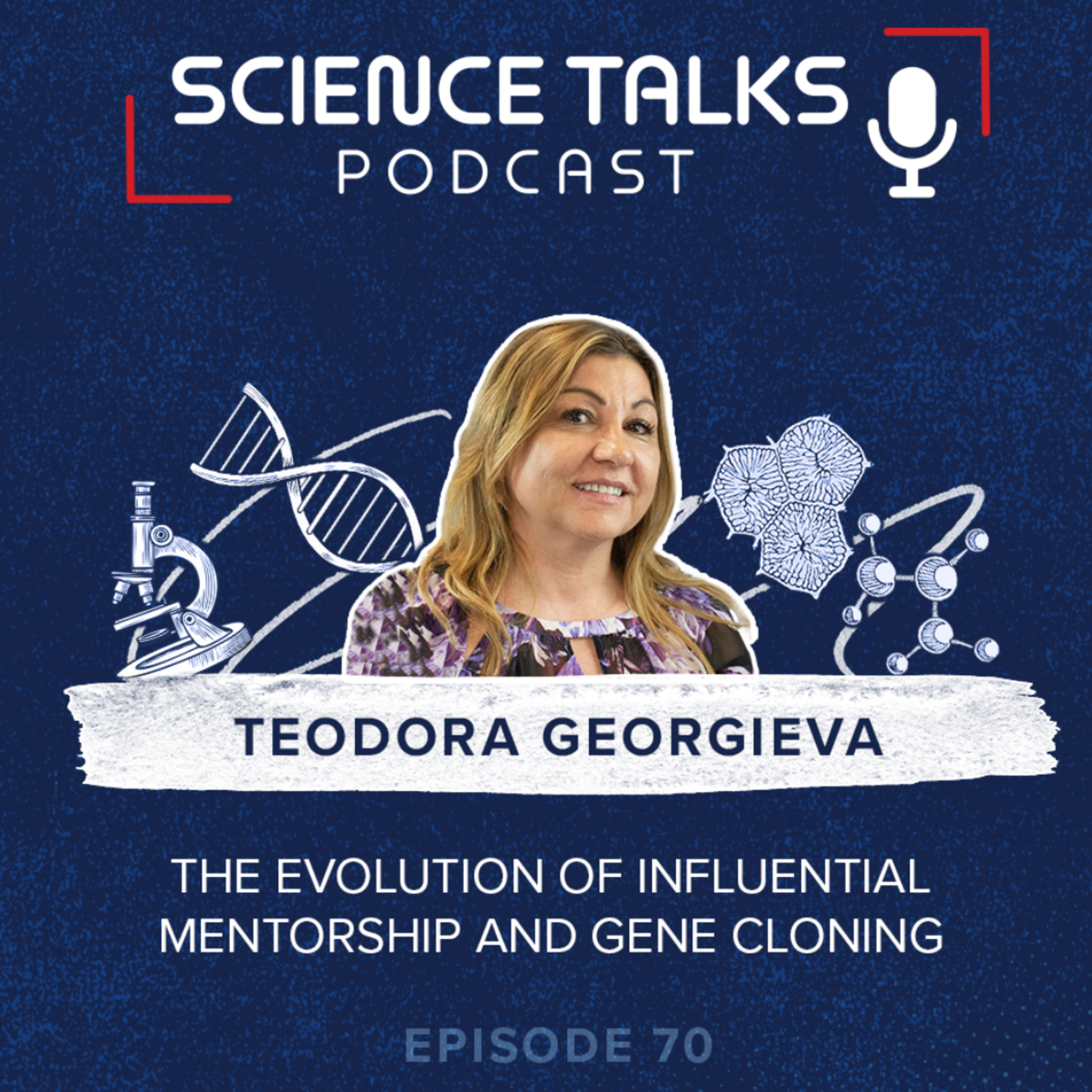
Science TalksEpisode 70: The evolution of influential mentorship and gene cloningDr. Teodora Georgieva is the Director of the University of Arizona’s GEMM Core Facility, she will talk aboutEarly influential mentors and projects that kept her wanting more Advancing the discoveries of novel therapeutics through custom model designGEMM Core’s impact on cancer researchThree things you will learn in this episode:What a University core facility is and how they are a helpful service How designer models can impact with cancer research—--------------------------The BIO5 Institute’s Amy Barber talks with membe...
2025-12-1622 min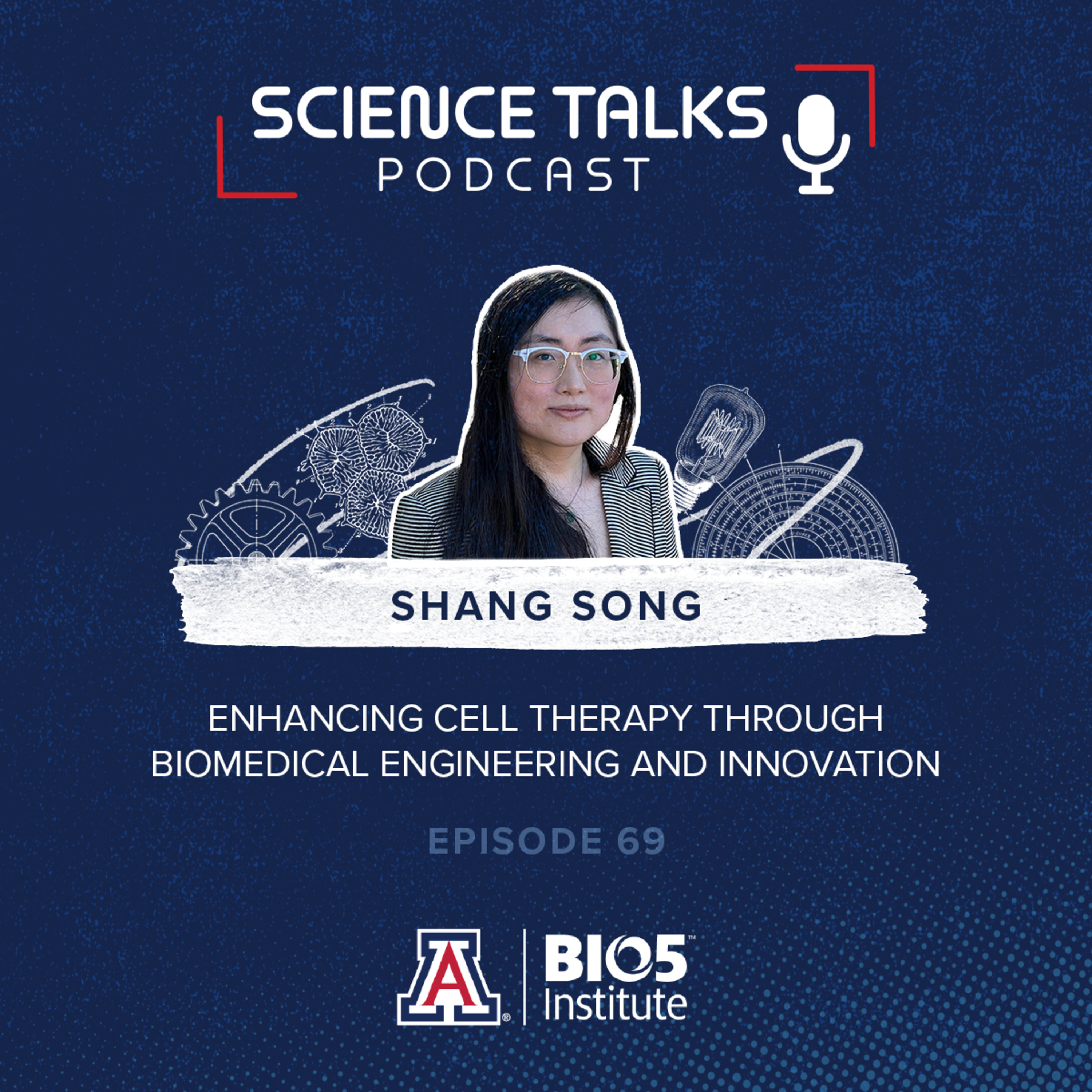
Science TalksEpisode 69: Enhancing Cell Therapy Through Biomedical Engineering and InnovationShang Song is an Assistant Professor in Biomedical Engineering and a BIO5 Researcher, she will talk aboutResearch approachBiomaterials and their usageHer Research focusRecent Discoveries in the LabMentorship’s impact on ScienceThree things you will learn in this episode:What Biomaterials areRecent Discoveries in Cell TreatmentsMentorship in Research Labs—--------------------------The BIO5 Institute’s Amy Barber talks with member and one of the University’s experts in biomedical engineering, Dr. Shang So...
2025-11-2626 min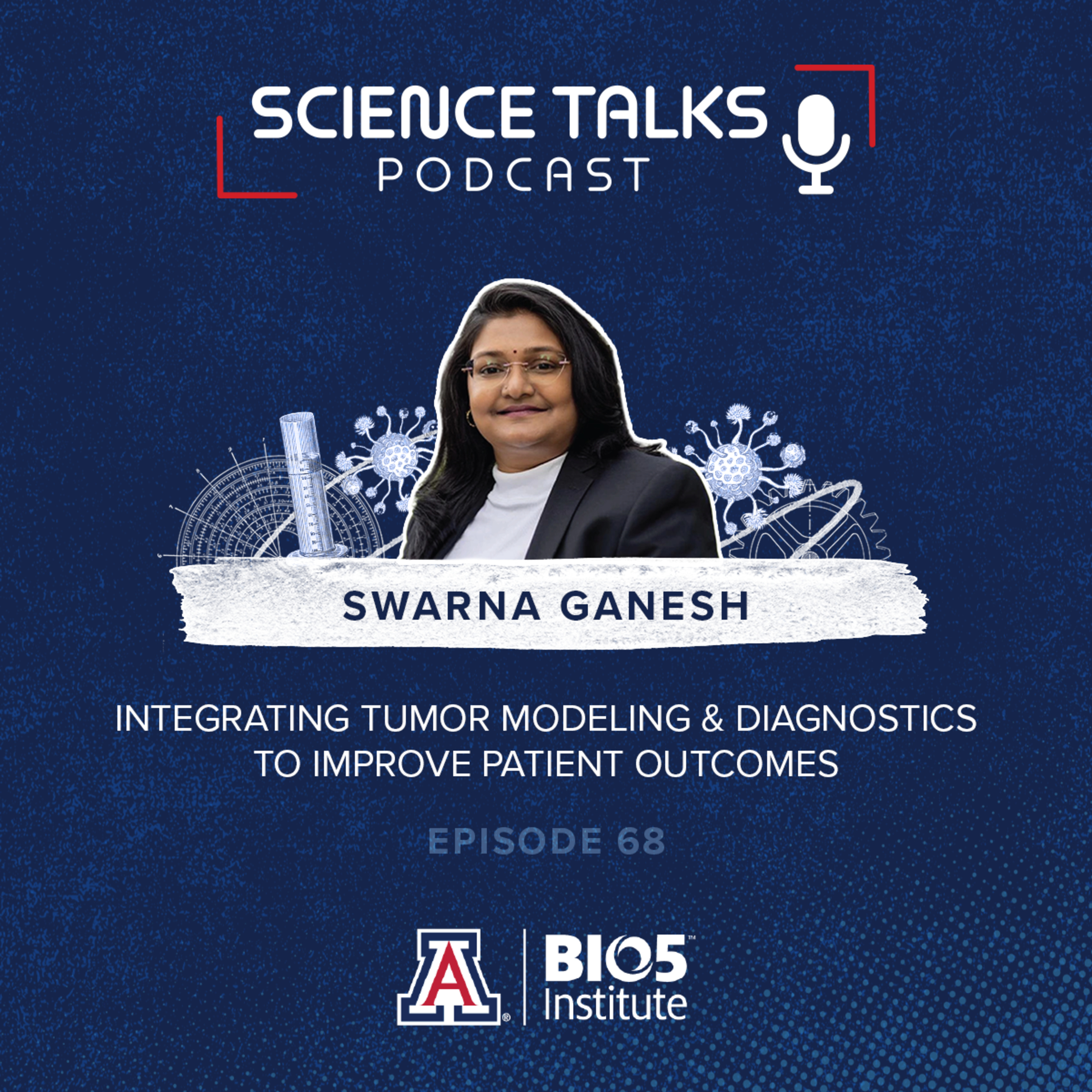
Science TalksEpisode 68: Integrating Tumor Modeling & Diagnostics to Improve Patient OutcomesSwarna Ganesh is an Assistant Professor and BIO5 Researcher. She will talk about:3D bioprintingCancer diagnosticsMentorshipLab experiencesPotential future of cancer treatment Three things you will learn about in this episode:Tumor TwinsBioprinting’s usage in medicine How engineering can personalize cancer treatment —--------------------------The BIO5 Institute’s Amy Barber talks with member and one of the University’s experts on the tumor modeling, Dr. Swarna Ganesh. Dr. Ganesh’s expertise spa...
2025-10-2925 min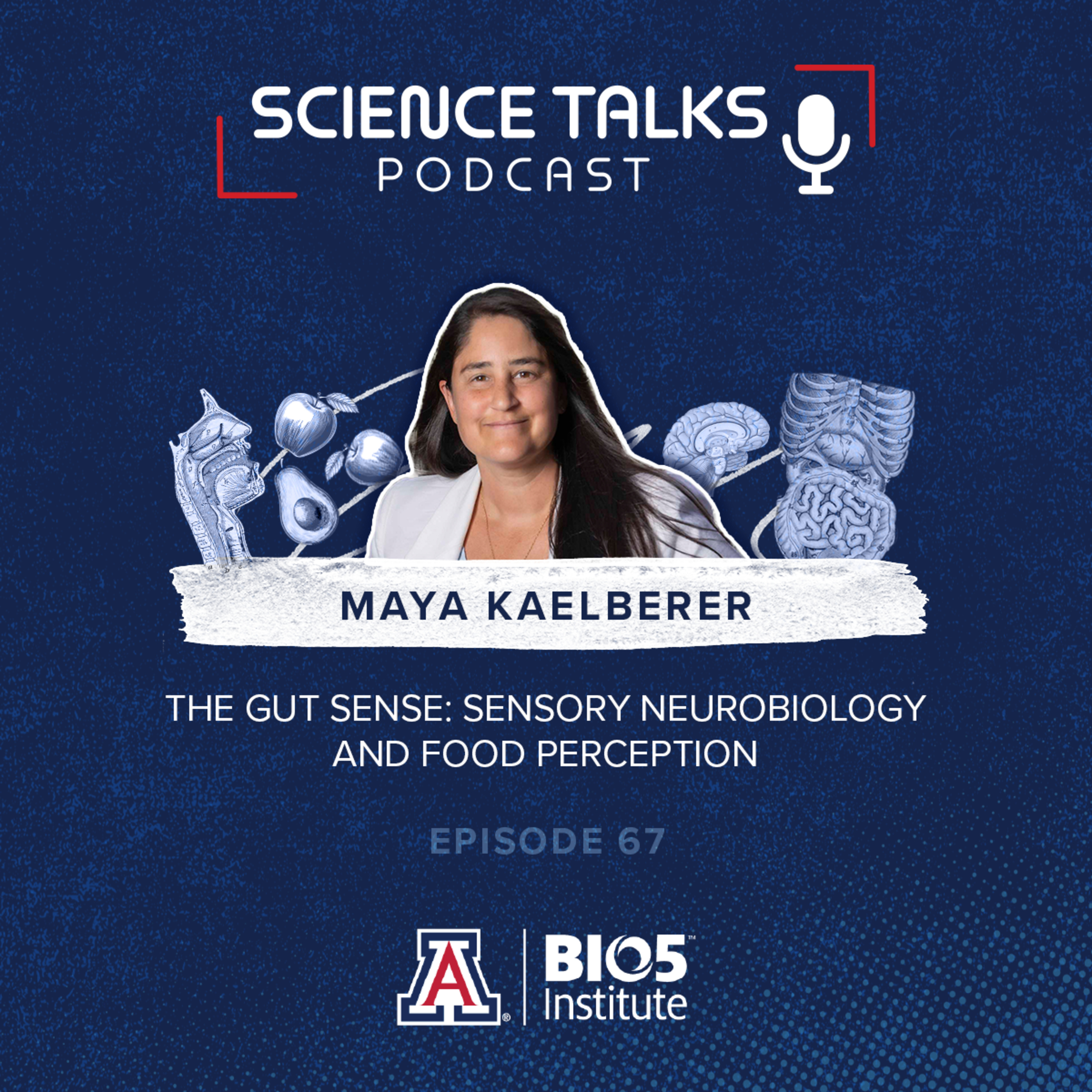
Science TalksEpisode 67: The Gut Sense: Sensory Neurobiology and Food PerceptionThree things you will learn in this episode:What are NeuroPods?Gut response to real vs artificial sugarGASTRONAUTS: a scientific community —--------------------------The BIO5 Institute’s Amy Barber talks with member and one of the University’s experts on the gut biome Dr. Maya Kaelberer. Dr. Kaelberer is working to understand how the gut senses and responds to the complex composition of food, going beyond traditional calorie counting. The lab’s main goal is to “decipher the nutritional code" by which the gut identifies and reacts to various nutrients...
2025-10-0622 min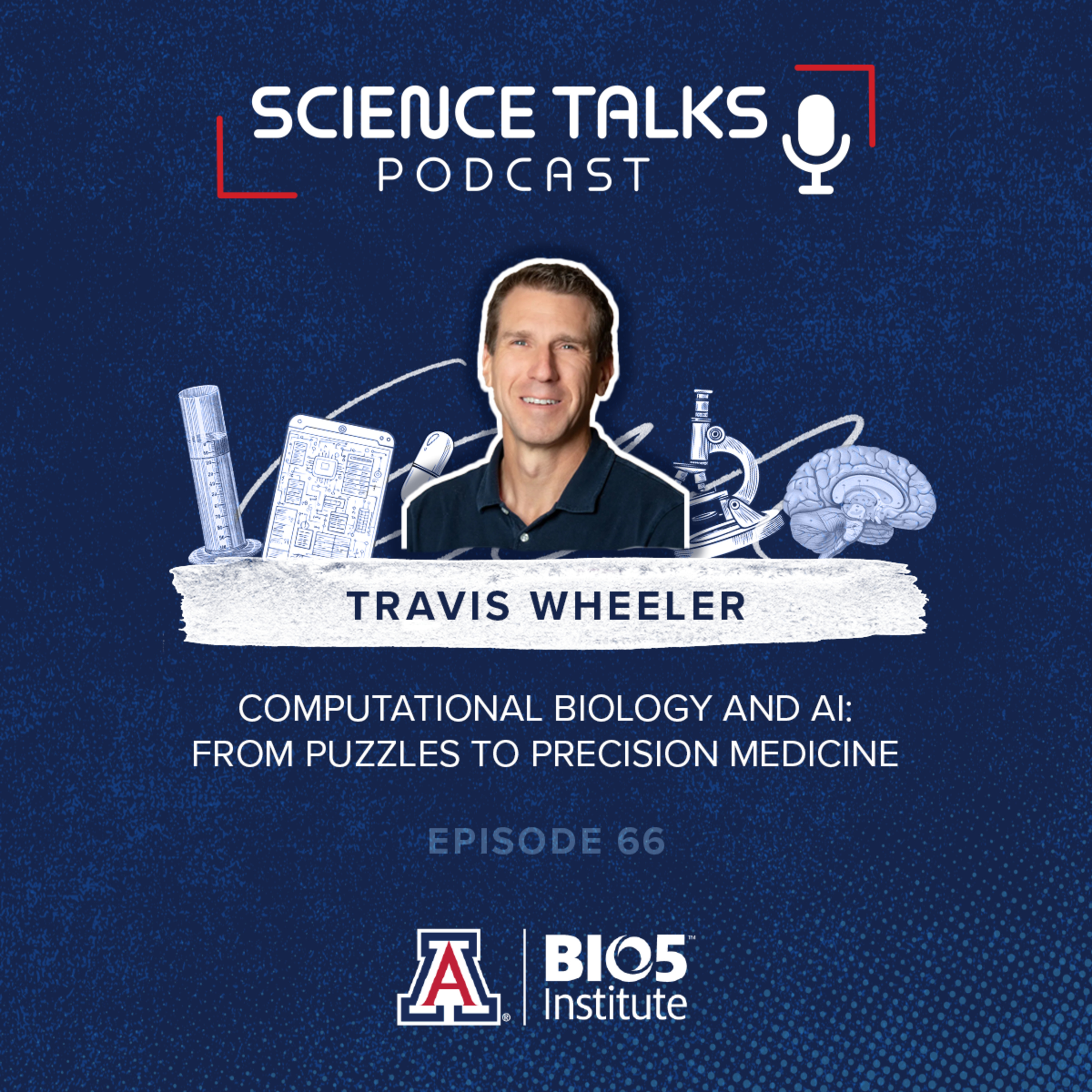
Science TalksEpisode 66: Computational Biology and AI: from Puzzles to Precision MedicineThree things you will learn in this episode:Drug Discovery and Machine Learning AI usage in modern Computational ResearchChallenges in using AI for Precision Medicine and how to combat them—--------------------------The BIO5 Institute’s Amy Barber talks with member and one of the University’s experts on AI, Dr. Travis Wheeler, Dr. Wheeler’s research group uses computational methods to advance genome research, drug discovery, and precision medicine. Listen in as they explore the rewarding aspects of his work, how computational tools are transforming drug discovery, and the futur...
2025-09-1626 min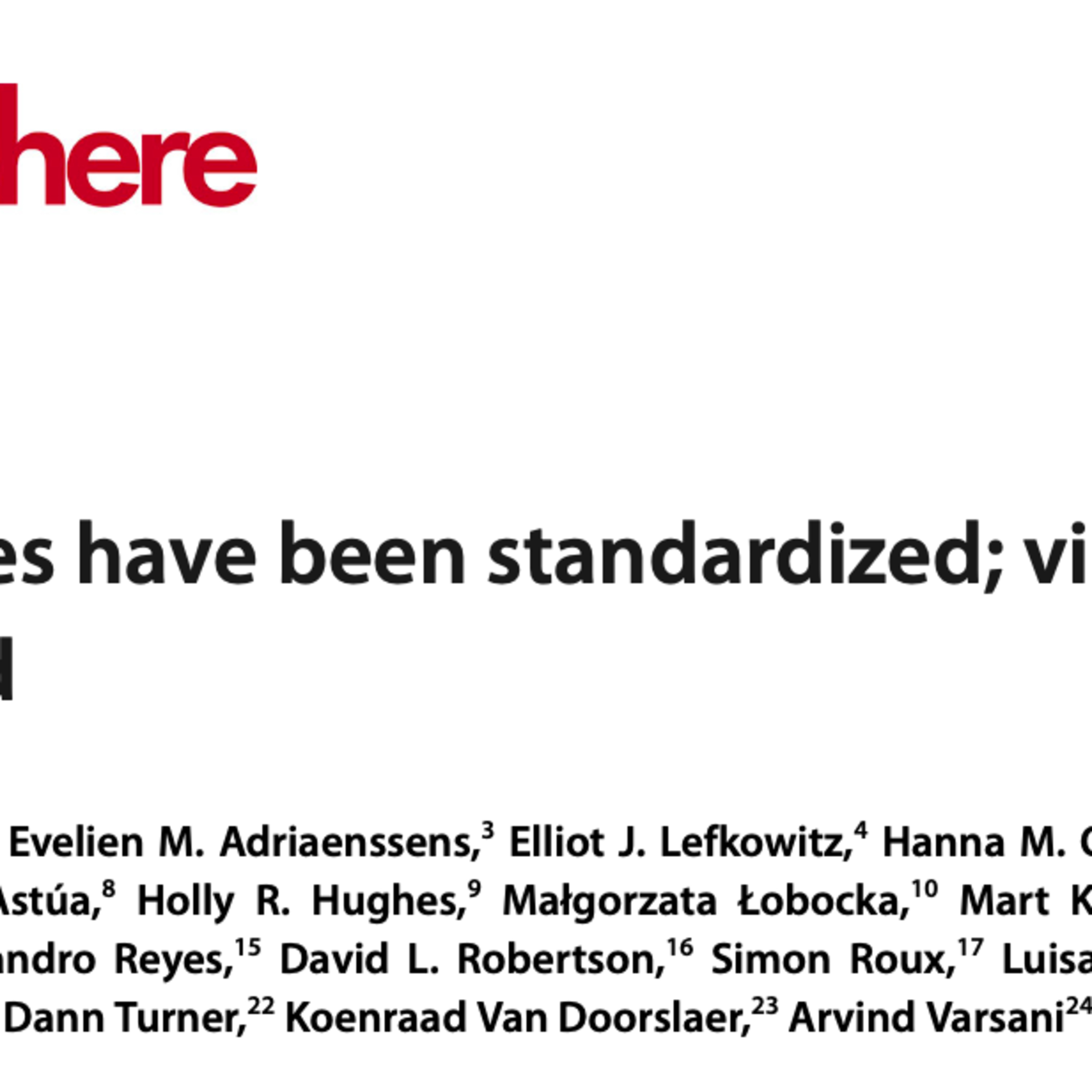
ReSayVirus species names have been standardized; virus names remain unchangedThis article "Virus species names have been standardized; virus names remain unchanged" is published in mSphere. Author:F. Murilo ZerbiniJournal:mSphereYear:2025Podcast type:ShortThe authors are F. Murilo Zerbini,1 Peter Simmonds,2 Evelien M. Adriaenssens,3 Elliot J. Lefkowitz,4 Hanna M. Oksanen,5 Poliane Alfenas-Zerbini,6Frank O. Aylward,7 Juliana Freitas-Astúa,8 Holly R. Hughes,9 Małgorzata Łobocka,10 Mart Krupovic,11 Jens H. Kuhn,12 ArcadyMushegian,13 Judit J. Penzes,14 Alejandro Reyes,15 David L. Robertson,16 Simon Roux,17 Luisa Rubino,18 Sead Sabanadzovic,19,20Donald B. Smith,2 Nobuhiro Suzuki,21 Dann Turner,22 Koen...
2025-07-0405 min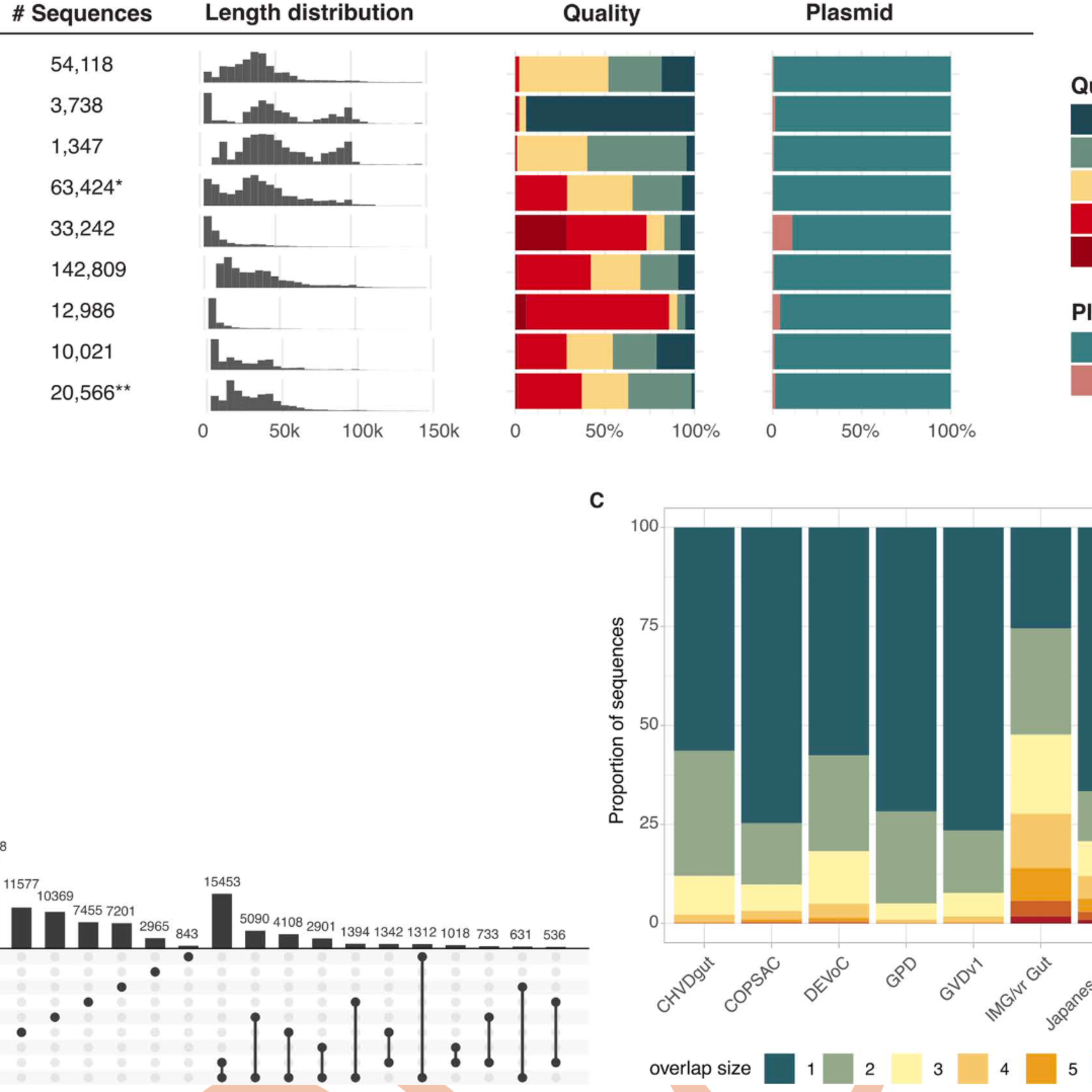
ReSayThe Aggregated Gut Viral Catalogue (AVrC): A unified resource for exploring the viral diversity of the human gutThis article "The Aggregated Gut Viral Catalogue (AVrC): Aunified resource for exploring the viral diversityof the human gut" is published in PLOS Computational Biology.Author:Anastasia GalperinaJournal:PLOS Computational BiologyYear:2025Podcast type:ExpertAnastasia Galperina,Gabriele Andrea Lugli,Christian Milani,Willem M. De Vos,Marco Ventura,Anne Salonen,Bonnie Hurwitz,Alise Jany PonseroAffiliations: Human Microbiome Research Program, Faculty of Medicine, University of Helsinki, Helsinki, F...
2025-05-0610 min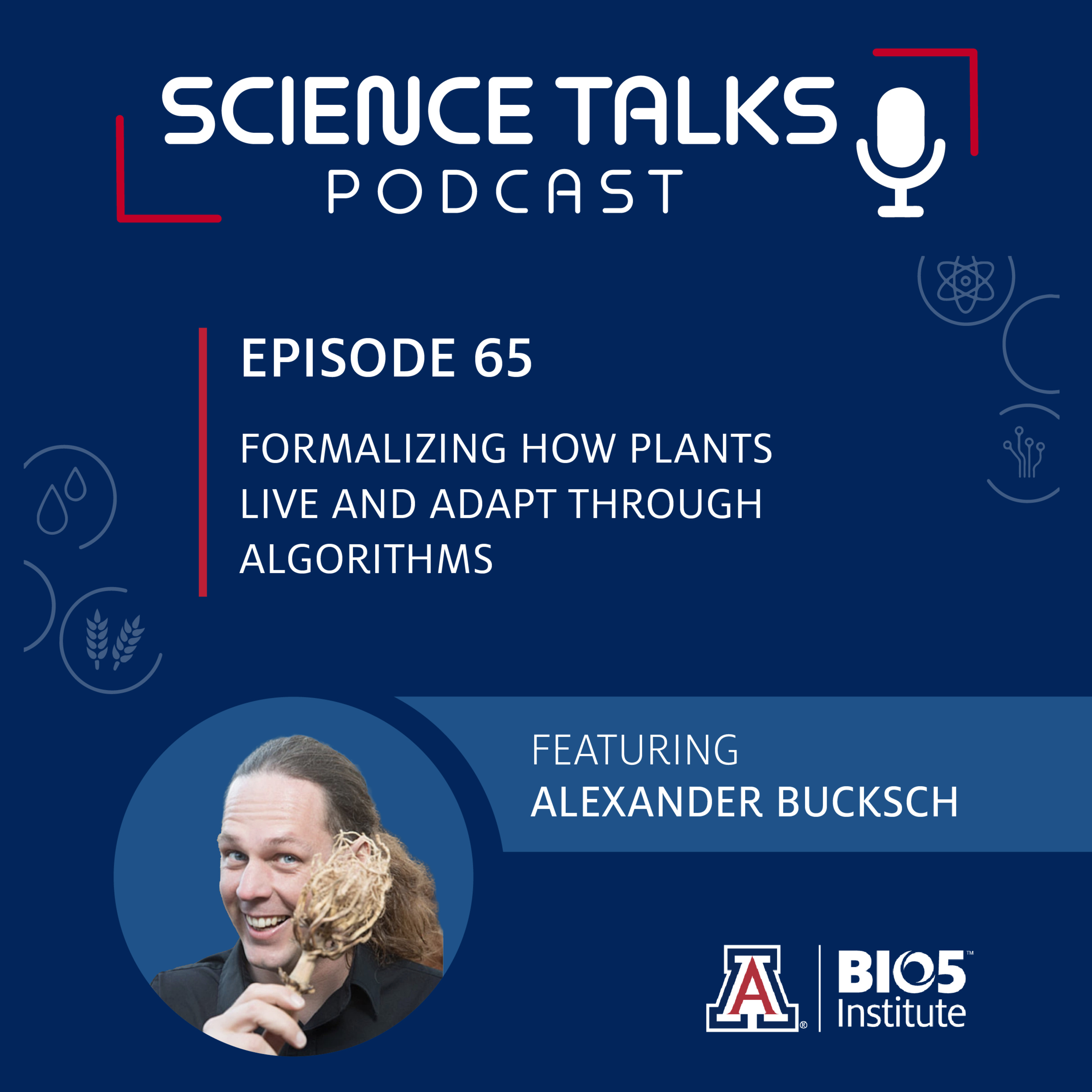
Science TalksEpisode 65: Formalizing how plants live and adapt through algorithmsAmy Barber was joined by Dr. Alexander Bucksch, a plant phenomicist and associate professor in the School of Plant Sciences at the University of Arizona. He has over 10 years of experience in developing and applying mathematical and computational methods to study plant morphology and physiology across scales and domains, from the organismal to the ecosystem level, and from above to below-ground.His current research focuses on root phenomics, ranging from the population level to the molecular level. In doing so, he develops computational imaging and simulation techniques that can be applied in the lab and the field.
2025-04-3028 min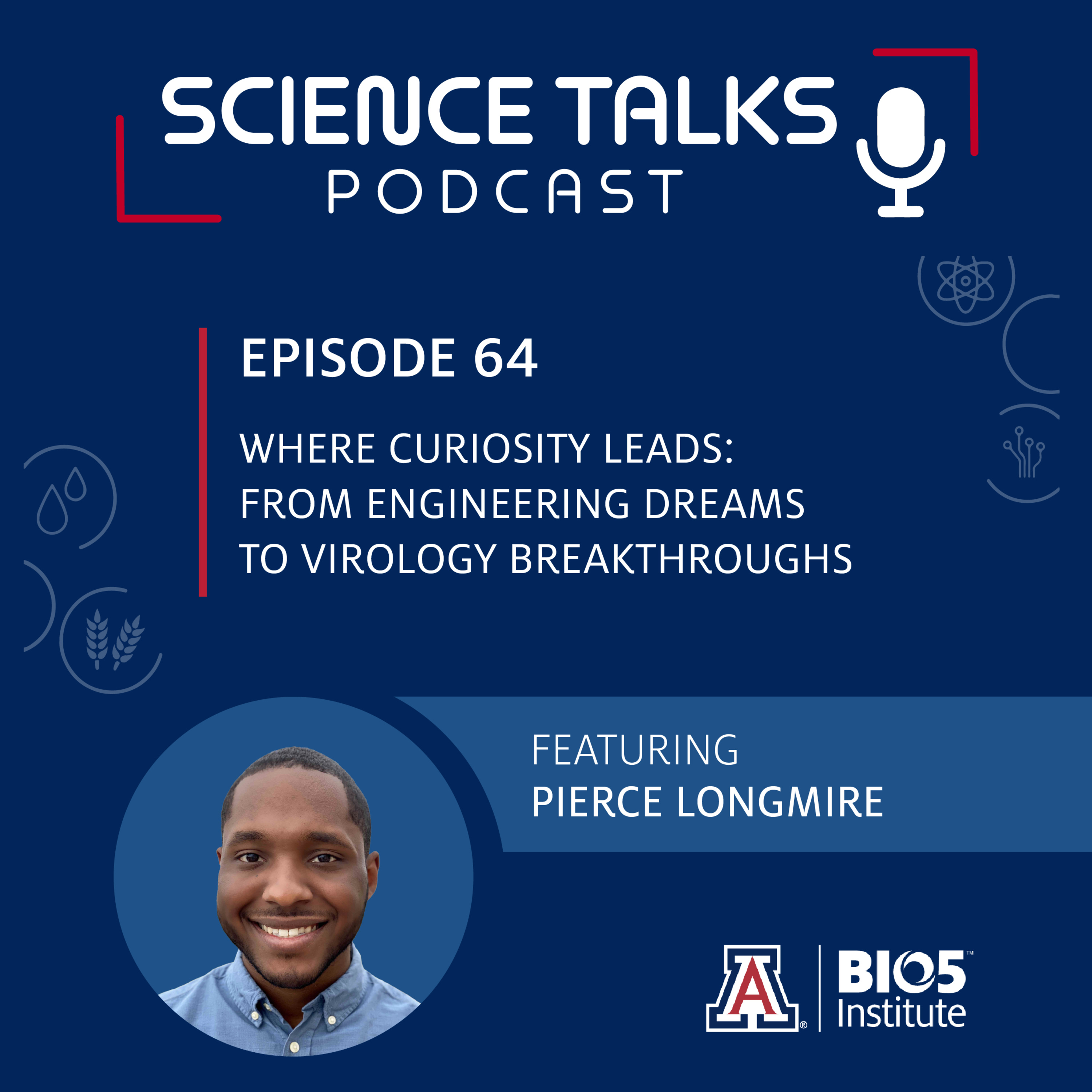
Science TalksEpisode 64: Where curiosity leads: From engineering dreams to virology breakthroughsAmy Barber was joined by Dr. Pierce Longmire, a postdoctoral research assistant in the lab of BIO5 member Felicia Goodrum in the Department of Immunobiology at the University of Arizona College of Medicine - Tucson. The overarching goal of the Goodrum lab is to understand how viruses can asymptomatically coexist within a human host. They study the human cytomegalovirus (HCMV), using it as a model for defining and understanding interactions between viruses and their hosts that allow for the entry into and exit from latent states. Dr. Longmire works on HCMV interactions with the host DNA damage response. This...
2025-04-1520 min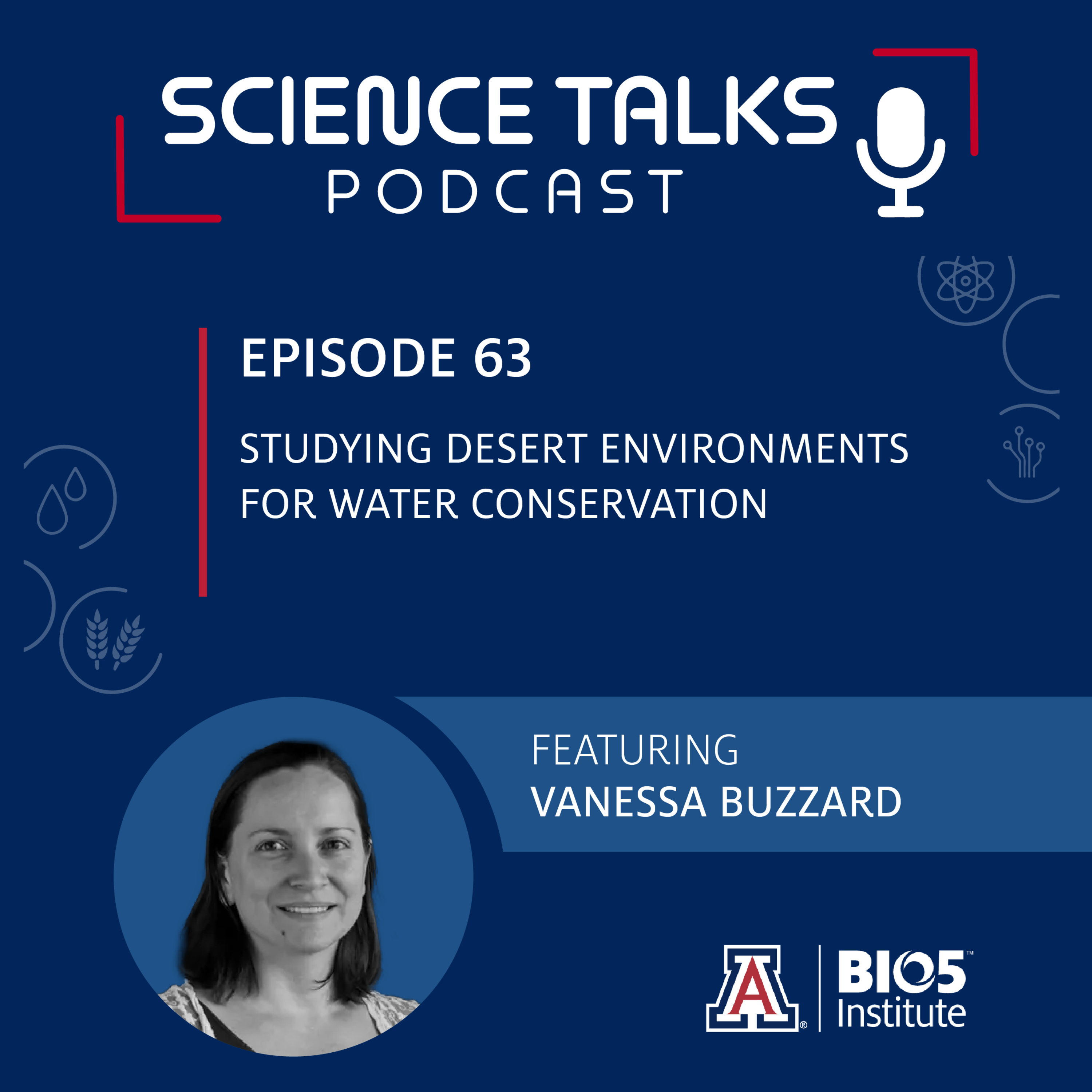
Science TalksEpisode 63: Studying desert environments for water conservation Today we are joined by Dr. Vanessa Buzzard, a senior research specialist at the University of Arizona School of Environmental and Natural Resources. Dr. Buzzard received her Ph.D. from the University of Arizona in 2017 where she focused on plant functional trait distribution, but has transitioned her studies from natural systems to urban environments. Today, she is a part of BIO5 member Laura Meredith’s lab where she questions the drivers of biodiversity and ecosystem function in relation to the effects of green infrastructure water management on soils in urban environments. Her research aims to quantify shifts in soil heal...
2025-03-2533 min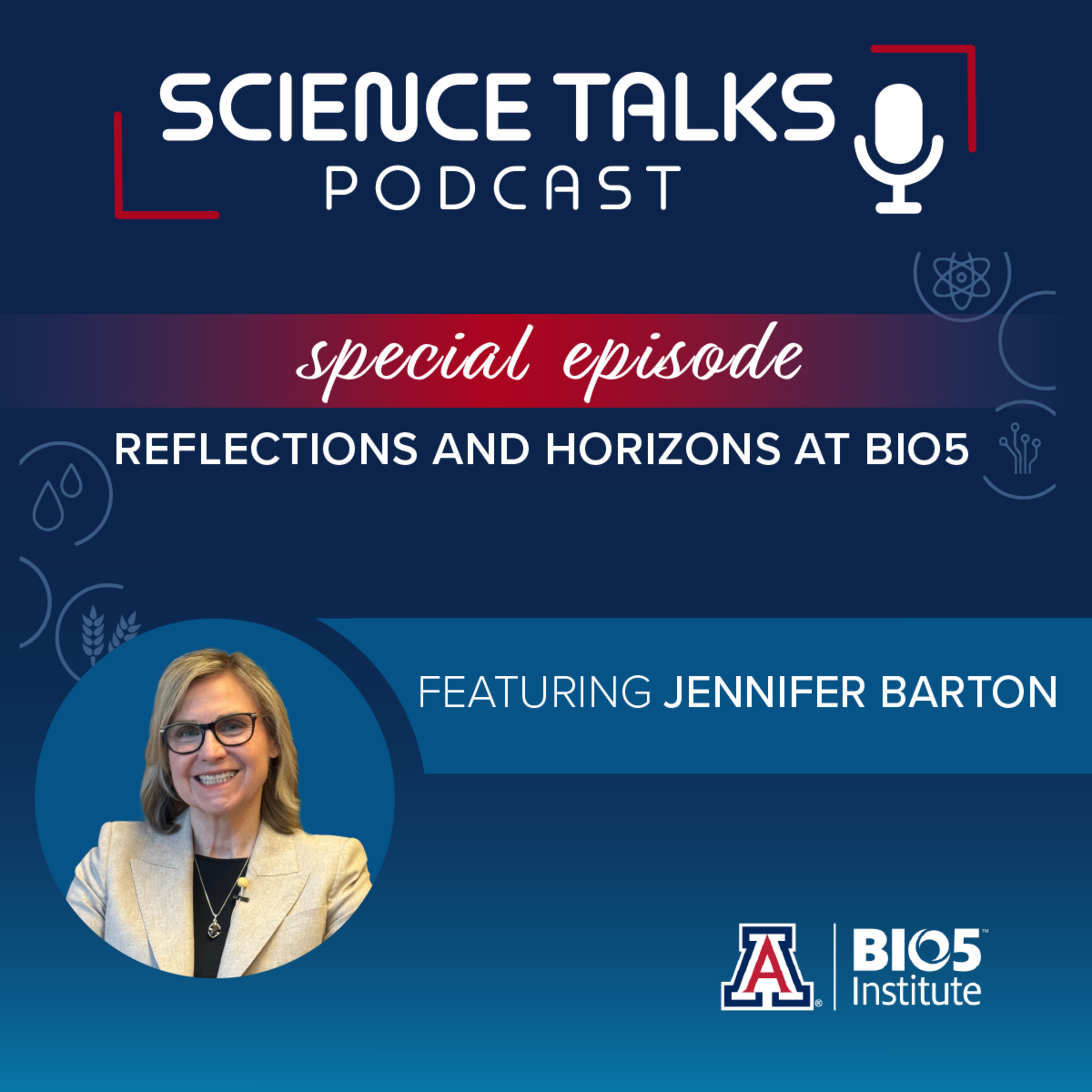
Science TalksEpisode 62: Reflections and horizons at BIO5As we wrap up 2024, today’s special episode will be a reflection on the remarkable achievements of the University of Arizona researchers and the groundbreaking work at BIO5. Caroline Bartelme was joined by BIO5 Institute director Jennifer Barton to reflect on some highlights, exciting research updates, and what’s next on the horizon for this coming year.
2024-12-1715 min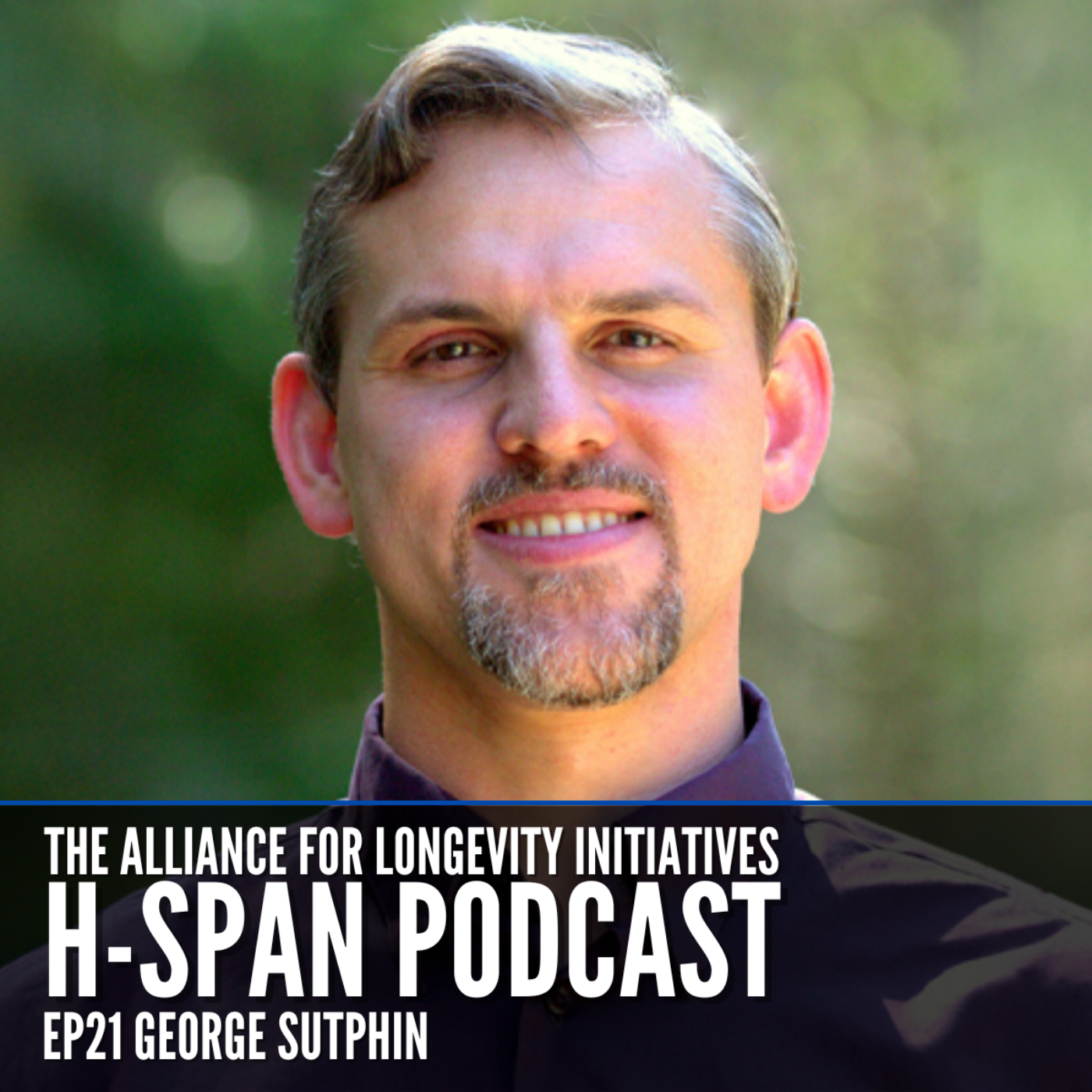
A4LI H-SPAN PodcastEpisode 21 - George SutphinThis week on A4LI’s H-SPAN Podcast, we sat down with Dr. George Sutphin, Assistant Professor of Molecular & Cellular biology at the BIO5 Institute at the University of Arizona.In this episode, we discuss Dr. Sutphin’s journey from aerospace engineering to geroscience, his lab’s research into aging, and what he is most looking forward to in the field of longevity science.
2024-10-2942 min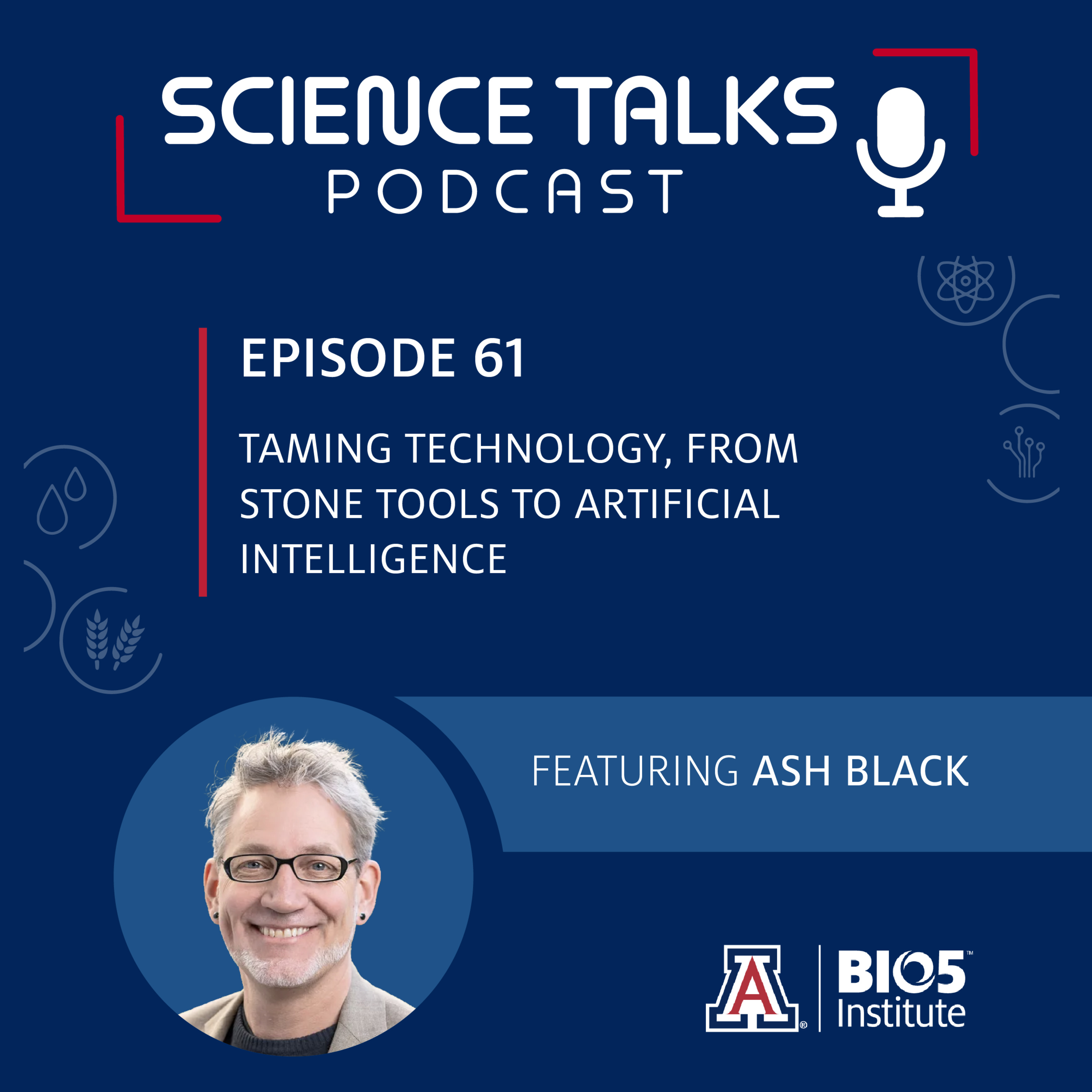
Science TalksEpisode 61: Taming technology, from stone tools to artificial intelligenceAmy Barber was joined by Ash Black, the director of AI & industry at the University of Arizona Institute for Computation & Data-Enabled Insight, to discuss his role coordinating AI outreach and building internships, jobs, and economic opportunities across Arizona. This institute provides training, education, collaboration, software licenses, and data to our researchers here at BIO5 and the U of A. Black works as a creative technologist and educator with an impressive record of innovation from the early internet to advanced technology, including AI and XR. As a specialist in student engagement, he uses experiential learning and pushes to use practical...
2024-10-2429 min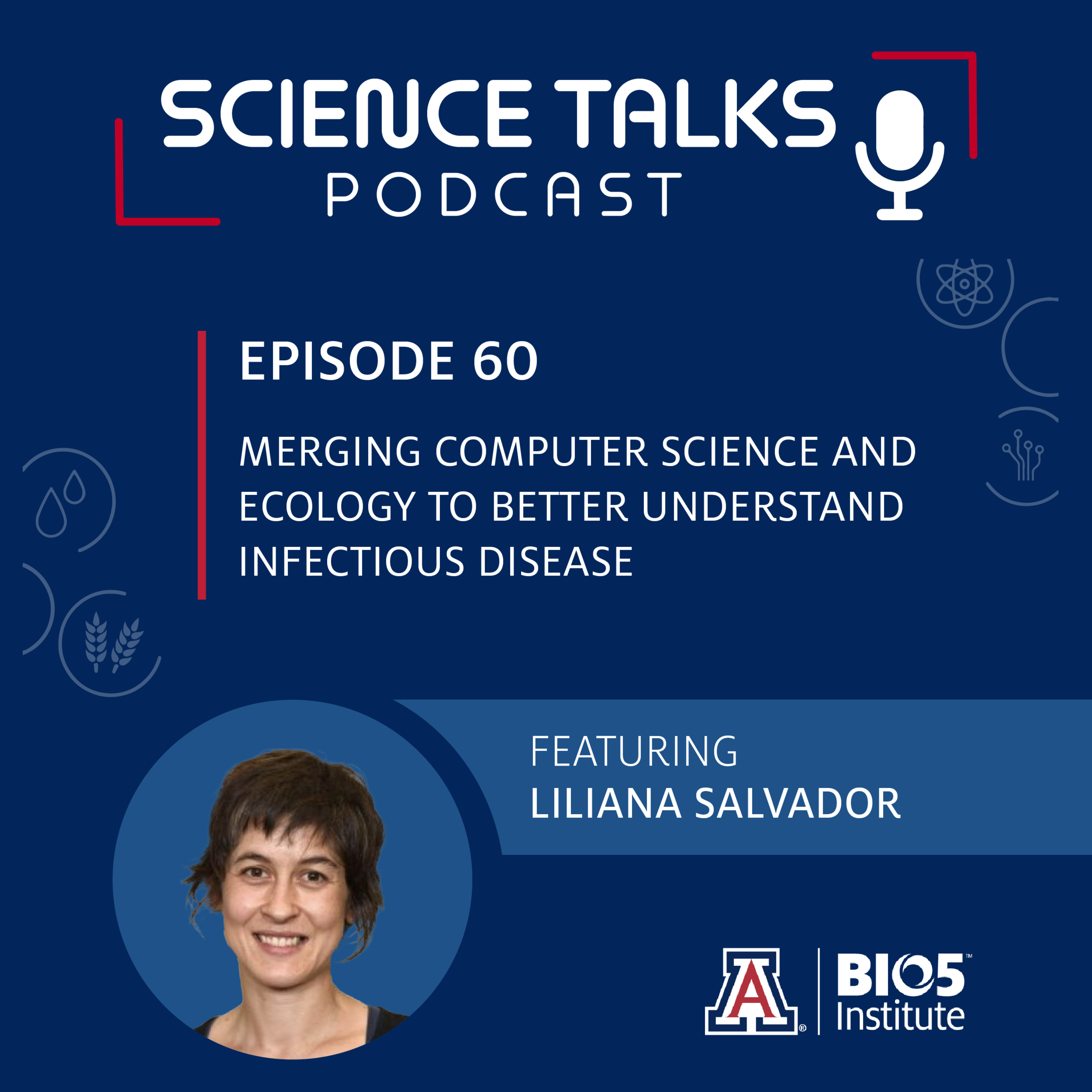
Science TalksEpisode 60: Merging computer science and ecology to better understand infectious diseaseIdentifying and understanding zoonotic diseases—infections that are spread between people and animals—can help predict future emergence risks, particularly in vulnerable populations. Combined with computational and data-based models, this research allows us to study potential diseases in the hopes of preventing outbreaks.
On this episode of Science Talks, Amy Barber is joined by Dr. Liliana Salvador, assistant professor of animal and comparative biomedical sciences, at the University of Arizona College of Agriculture, Life & Environmental Sciences. Dr. Salvador combines ecological, genomic, epidemiological, and movement data with computational and mathematical models to understand zoonotic diseases in wildlife, livestock, and h...
2024-09-0539 min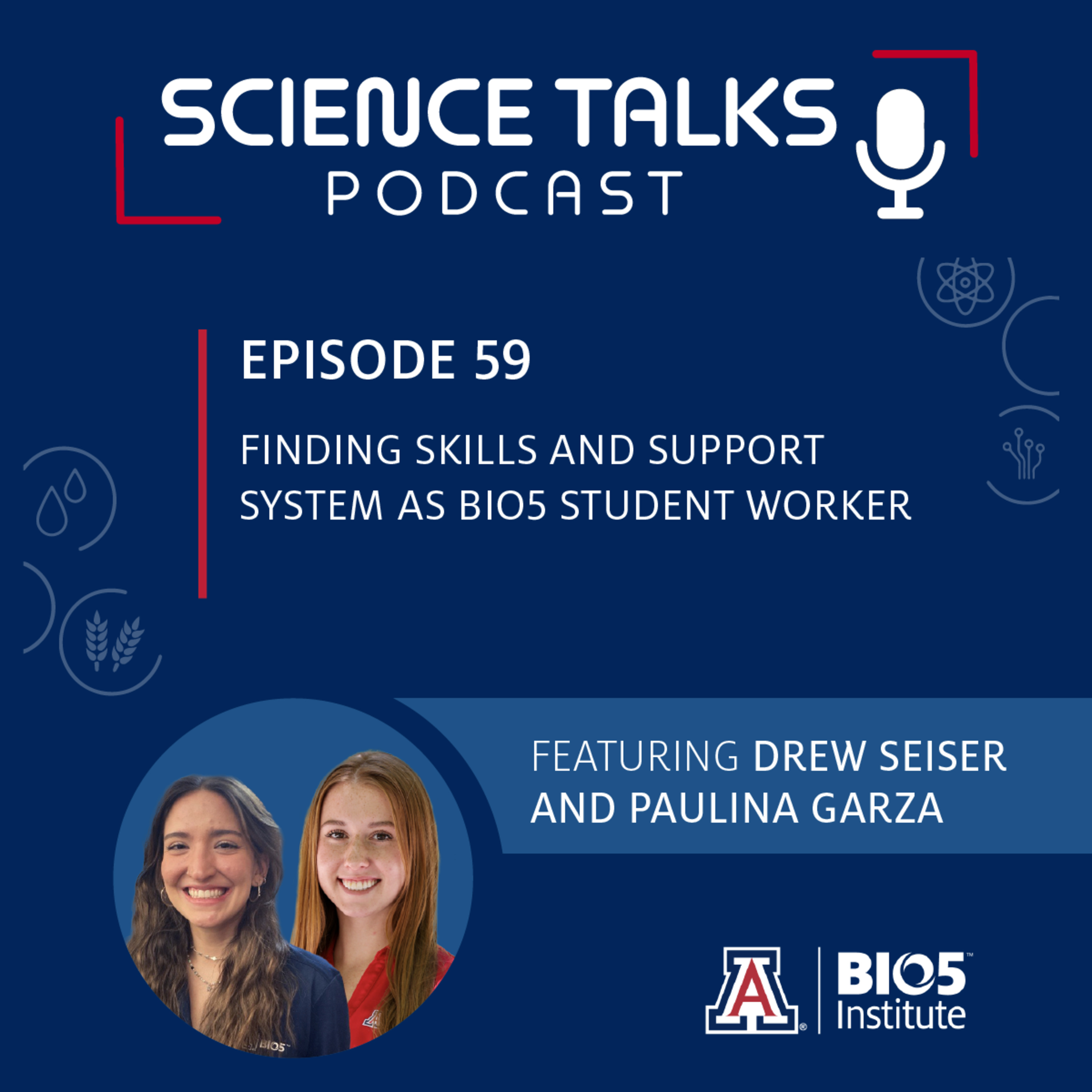
Science TalksEpisode 59: Finding skills and support system as BIO5 student workerStudents are an important part of the BIO5 Institute at the University of Arizona and share in the success we achieve here. The different administrative departments within BIO5 look for ways to engage with students and train them on the business side of science. One of those departments is the Public Affairs department where students assist with communications and marketing projects, community and faculty events, and other special projects. One such project is our undergraduate internship program, the BIO5 Ambassadors. Amy Barber is joined on Science Talks by two of those BIO5 students(now Un...
2024-08-2932 min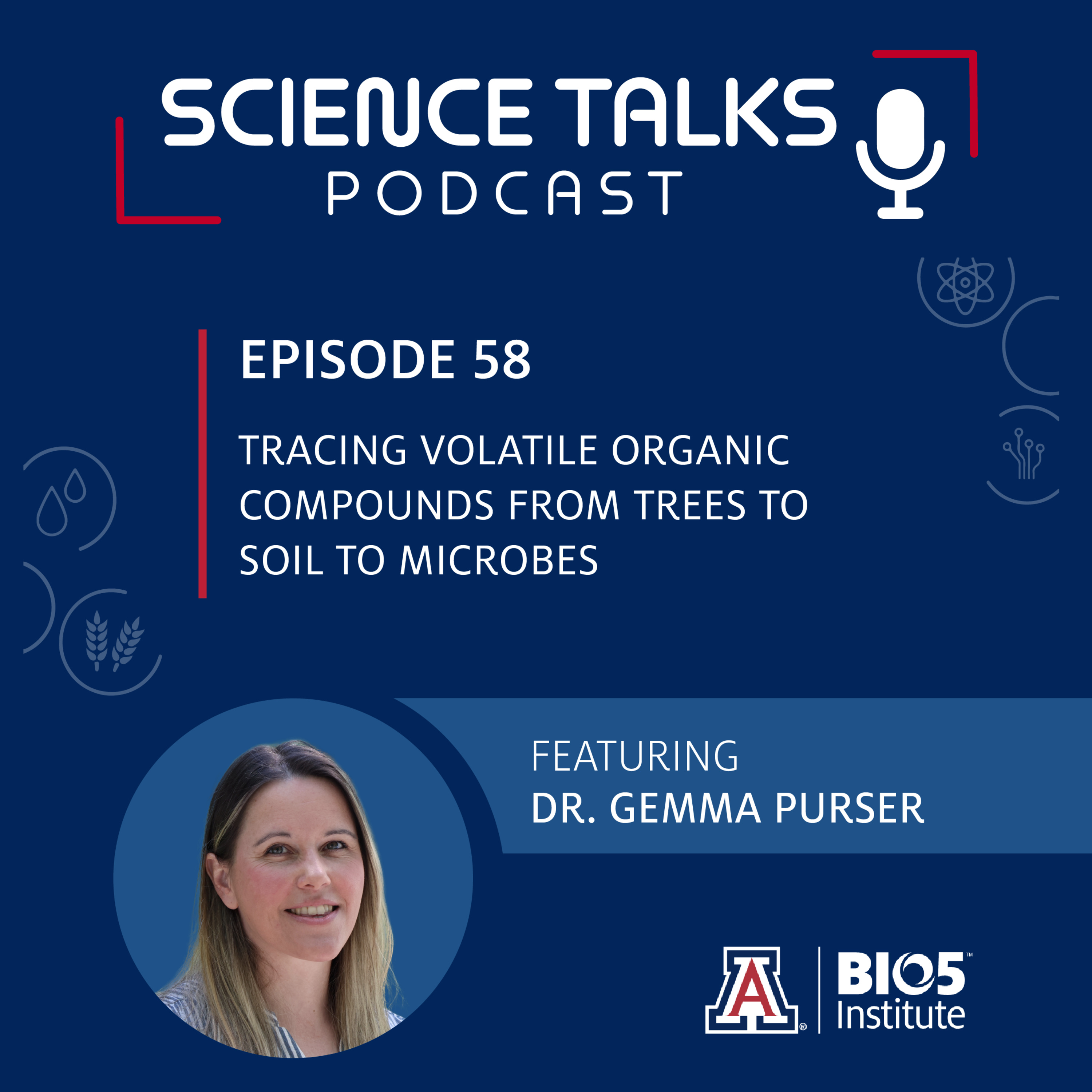
Science TalksEpisode 58: Tracing volatile organic compounds from trees to soil to microbesAir pollution, which has implications for human health particularly in urban areas, may be attributed to volatile organic compounds, or VOCs. VOCs in the atmosphere have various sources, but of rising concern are those originating from personal care items, cleaning products, and industrial solvents. Amy Barber and Caroline Bartelme were joined by Dr. Gemma Purser a 2024 BIO5 Postdoctoral Fellow in Dr. Laura Meredith’s lab in the School of Natural Resources and the Environment at the University of Arizona College of Agriculture, Life & Environmental Sciences. Specializing in atmospheric and analytical chemistry, Dr. Purser works to further understand VOCs so we bet...
2024-07-2433 min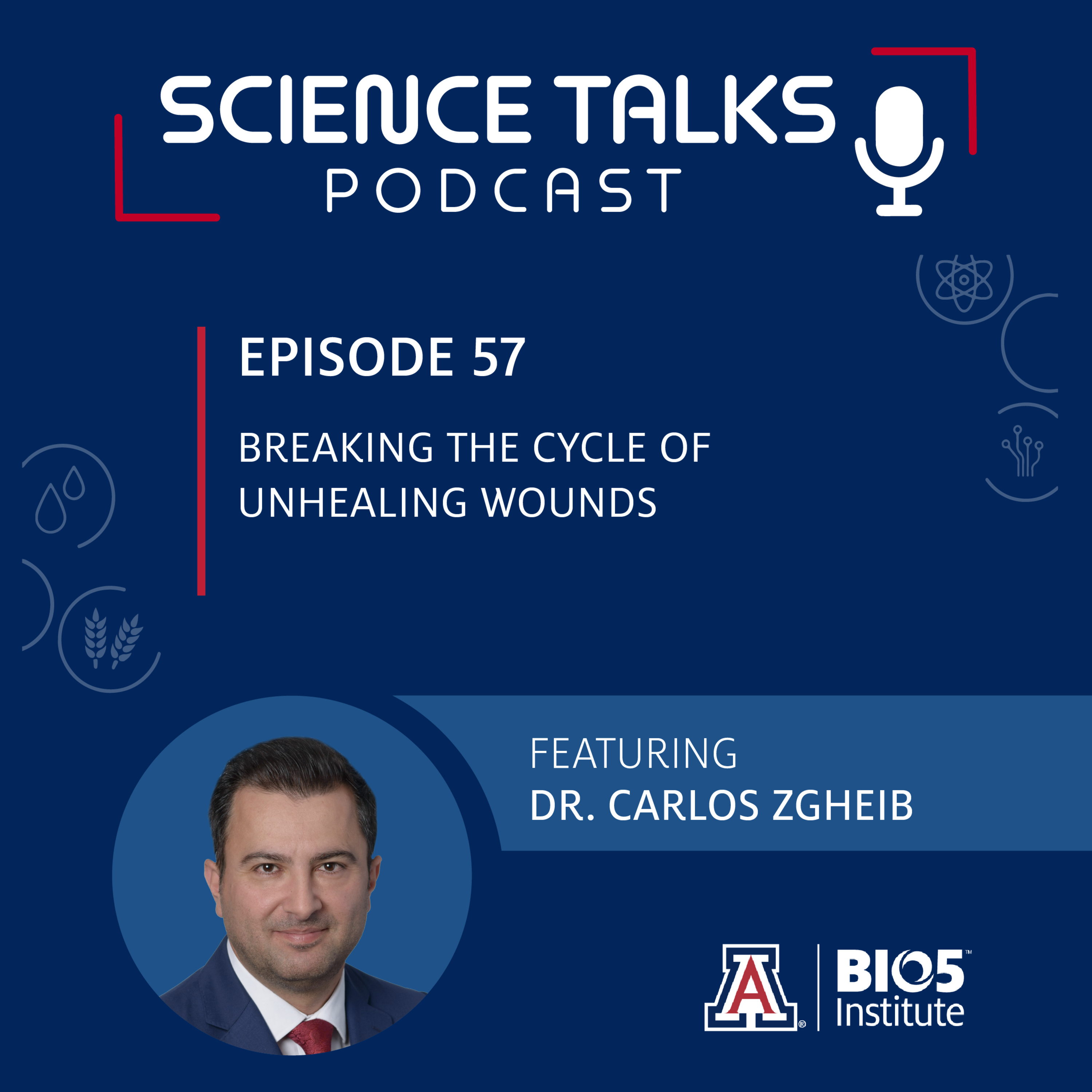
Science TalksEpisode 57: Breaking the cycle of unhealing woundsA chronic wound does not heal in an orderly set of stages or predictable amount of time. These wounds often remain in the inflammatory stage for too long, taking years to heal, or never healing at all. Biomedical research uses regenerative medicine, tissue repair, nanotechnology, and various biomaterials to target chronic injuries like this. It’s important for researchers to focus on targeting an anti-inflammatory response within molecules, using regenerative techniques to combat oxidative and inflammatory stressors that would otherwise exacerbate the healing process. For this episode of Science Talks, Amy Barber talks with Dr. Carlos Zgheib, an a...
2024-07-0333 min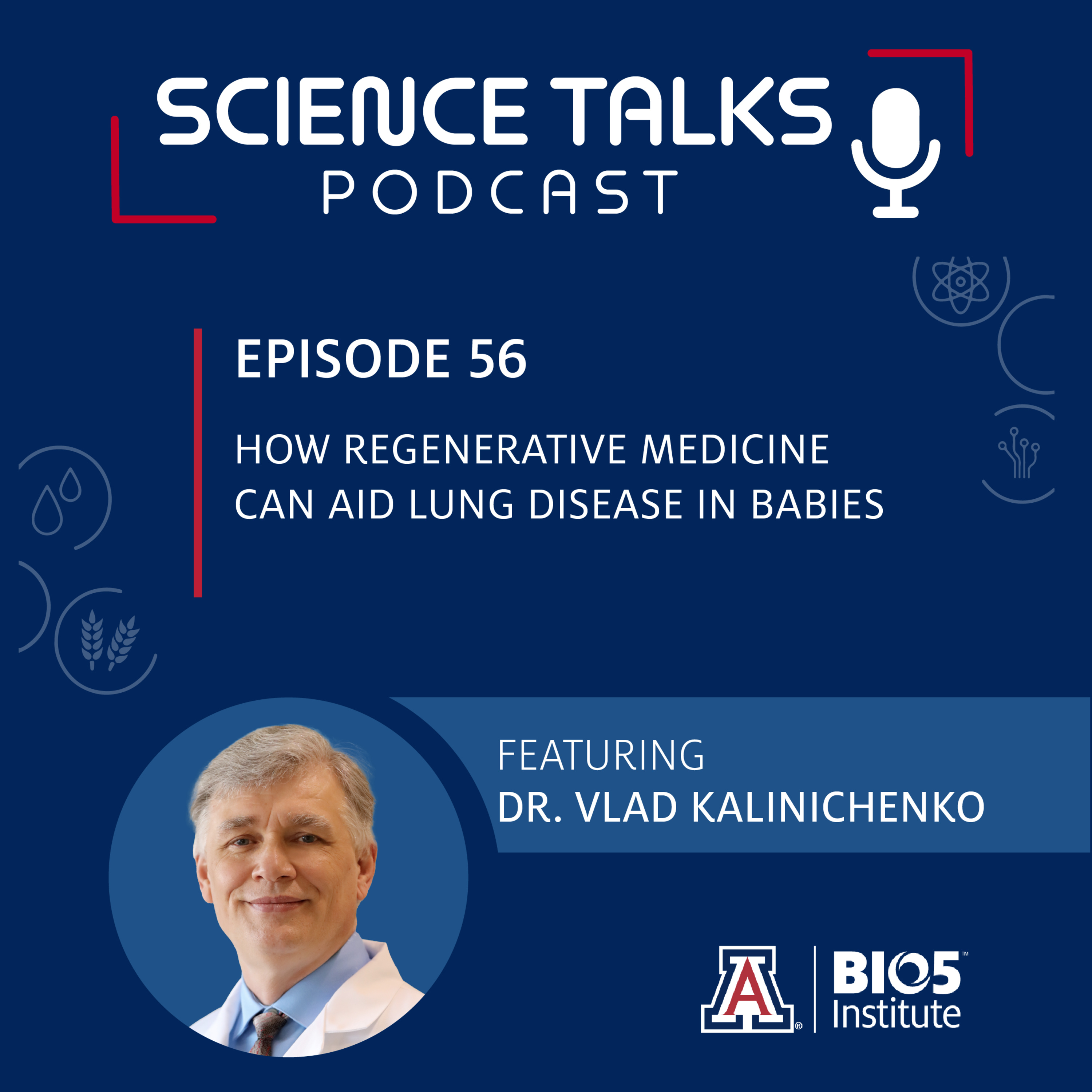
Science TalksEpisode 56: How regenerative medicine can aid lung disease in babiesIn many cases where babies are born prematurely, they often have underdeveloped lungs. This can cause breathing problems and neonatal lung diseases that require long-term treatment, or even lung transplantation. It’s critical for research to be done to provide treatments that can help these premature babies survive so they can grow up healthy. Amy Barber is joined on Science Talks by Dr. Vlad Kalinichenko, an internationally renowned research scientist and director of the Phoenix Children’s Research Institute at the University of Arizona College of Medicine-Phoenix. Kalinichenko was recently awarded a $3M grant from the National Institutes of...
2024-06-1225 min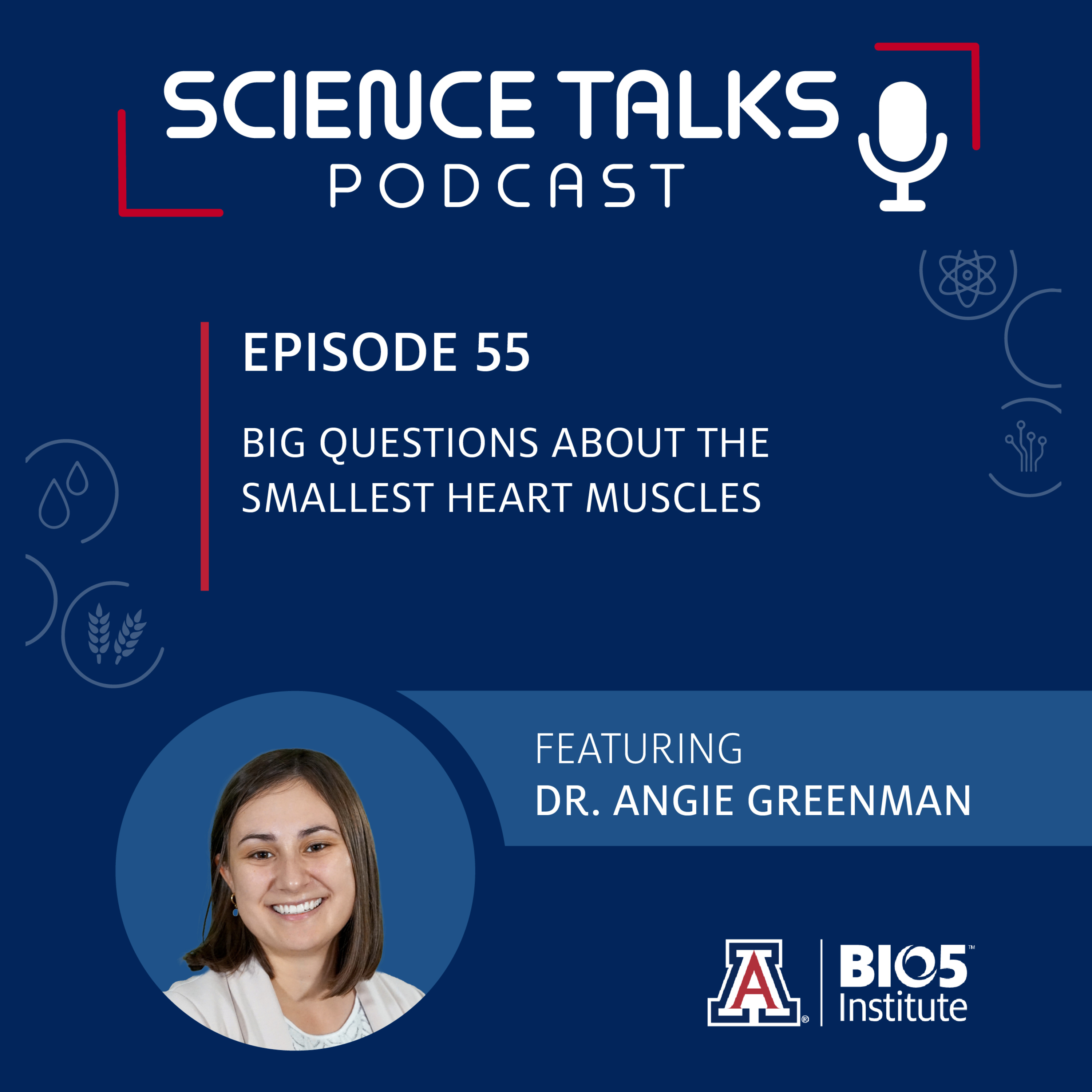
Science TalksEpisode 55: Big questions about the smallest heart musclesUnderstanding the role of cardiac myosin binding protein-c in muscle function can offer insight into cardiovascular disease. Mutations and abnormalities in this protein can lead to defects in the cardiac system, including heart failure in adults. Amy Barber and Caroline Bartelme are joined by Dr. Angie Greenman, a 2024 BIO5 Postdoctoral Fellow in Dr. Samantha (Sam) Harris’ lab in the Department of Physiology at the University of Arizona College of Medicine – Tucson. Dr. Greenman studies the molecular mechanisms of cardiac myosin binding protein-c that will hopefully lead to better outcomes for understanding muscle function and cardiac disease.
2024-05-2223 min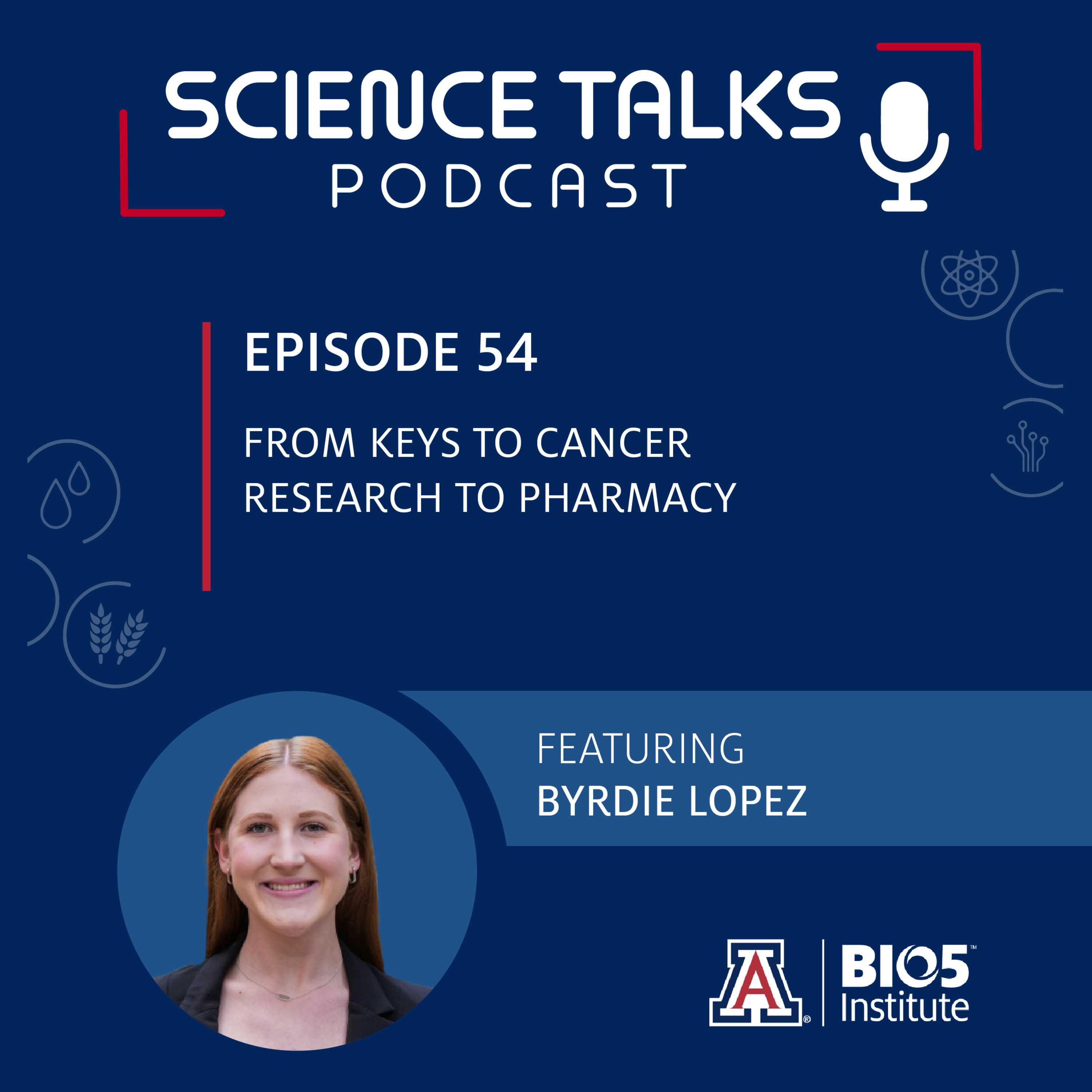
Science TalksEpisode 54: From KEYS to cancer research to pharmacyAmy Randall-Barber and her co-host, Paulina Garza, welcomed Byrdie Lopez to the latest episode of Science Talks. Lopez is a University of Arizona undergraduate pursuing a double major in biochemistry and molecular cellular biology on track to attend pharmacy school. Her journey at the BIO5 Institute began as a KEYS Research intern in 2022 working with BIO5 member Wei Wang in the R Ken Coit College of Pharmacy. Only a few years later, she is a student assistant with KEYS, conducting outreach to local high schools, and diving deeper into investigating how chemistry can help cancer patients.
2024-05-0133 min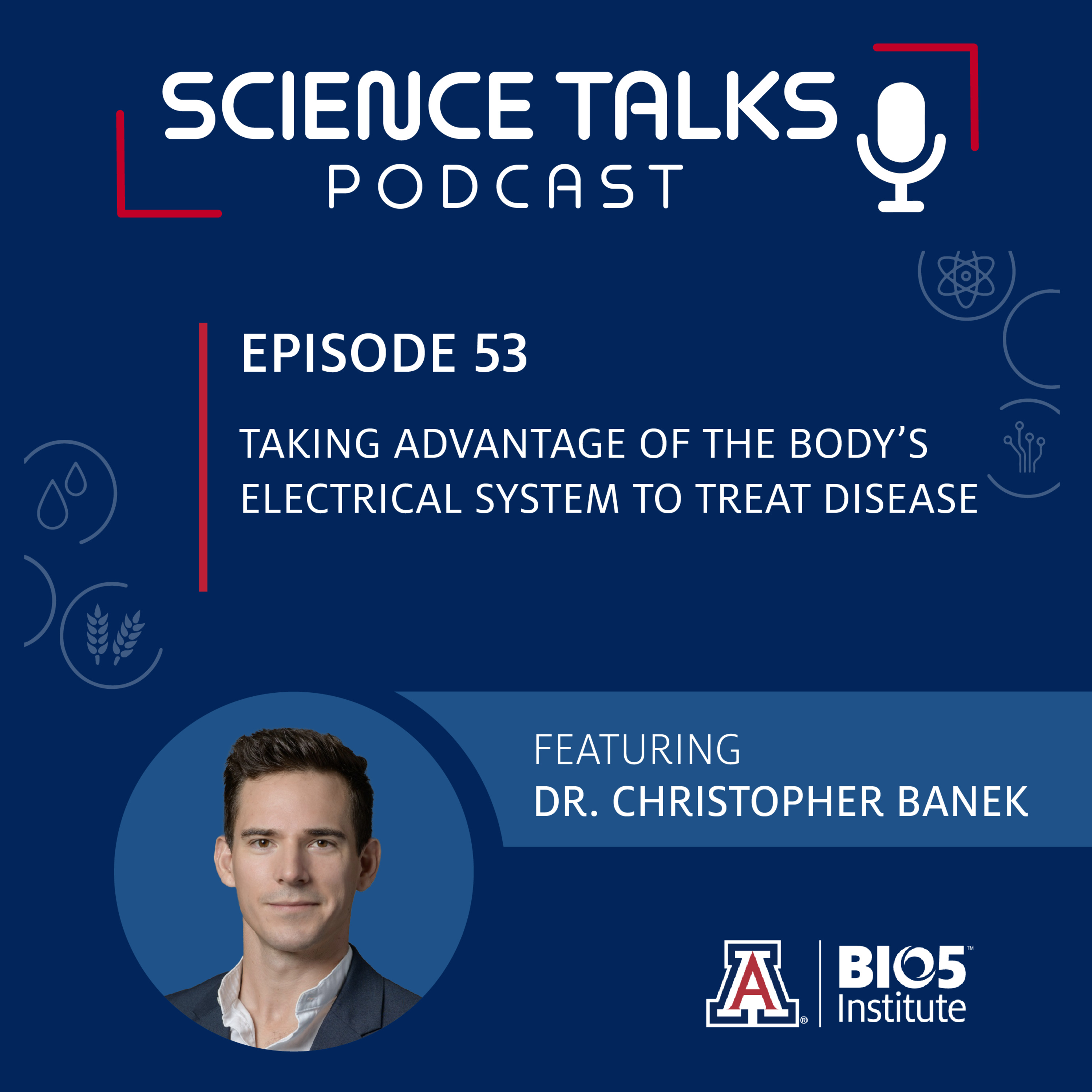
Science TalksEpisode 53: Taking advantage of the body’s electrical system to treat diseaseHigh blood pressure, also known as hypertension, affects nearly half of American adults and is the leading risk factor for cardiovascular disease. Researchers are working to better understand the role of the peripheral nervous system, the part of your nervous system that lies outside your brain and spinal cord, in the development of cardiovascular as well as renal diseases. Amy Randall-Barber from the BIO5 Institute was joined on Science Talks by Dr. Christopher Banek, BIO5 member and assistant professor in the Department of Physiology at University of Arizona College of Medicine - Tucson. Dr. Banek works in the nexus of ca...
2024-04-1028 min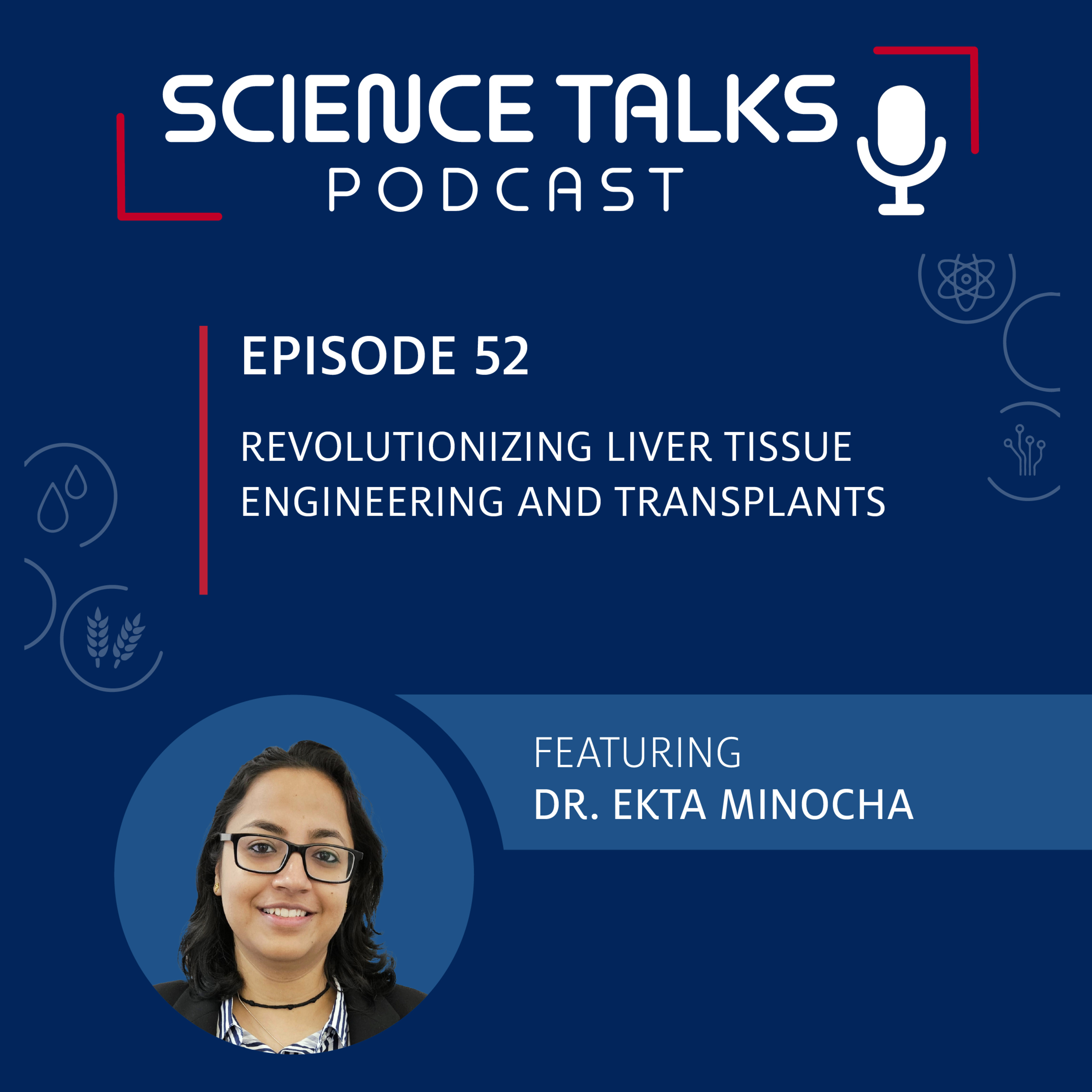
Science TalksEpisode 52: Revolutionizing liver tissue engineering and transplantsInduced pluri-potent stem cells (iPSC) are widely used in therapeutics for disease modeling, regenerative medicine, and drug discovery. Using patients’ cells, scientists can regenerate their cells into iPSC and recreate new organs for patients who need them. Amy Randall-Barber from the BIO5 Institute was joined on Science Talks by Dr. Ekta Minocha, a 2023 BIO5 postdoctoral fellow working in the Jason Wertheim lab at the University of Arizona College of Medicine – Tucson. Dr. Minocha's work focuses on the development of bioartificial liver tissues. She hopes that one day they can replace a failing liver in the human body and expedite the waiting...
2024-03-2717 min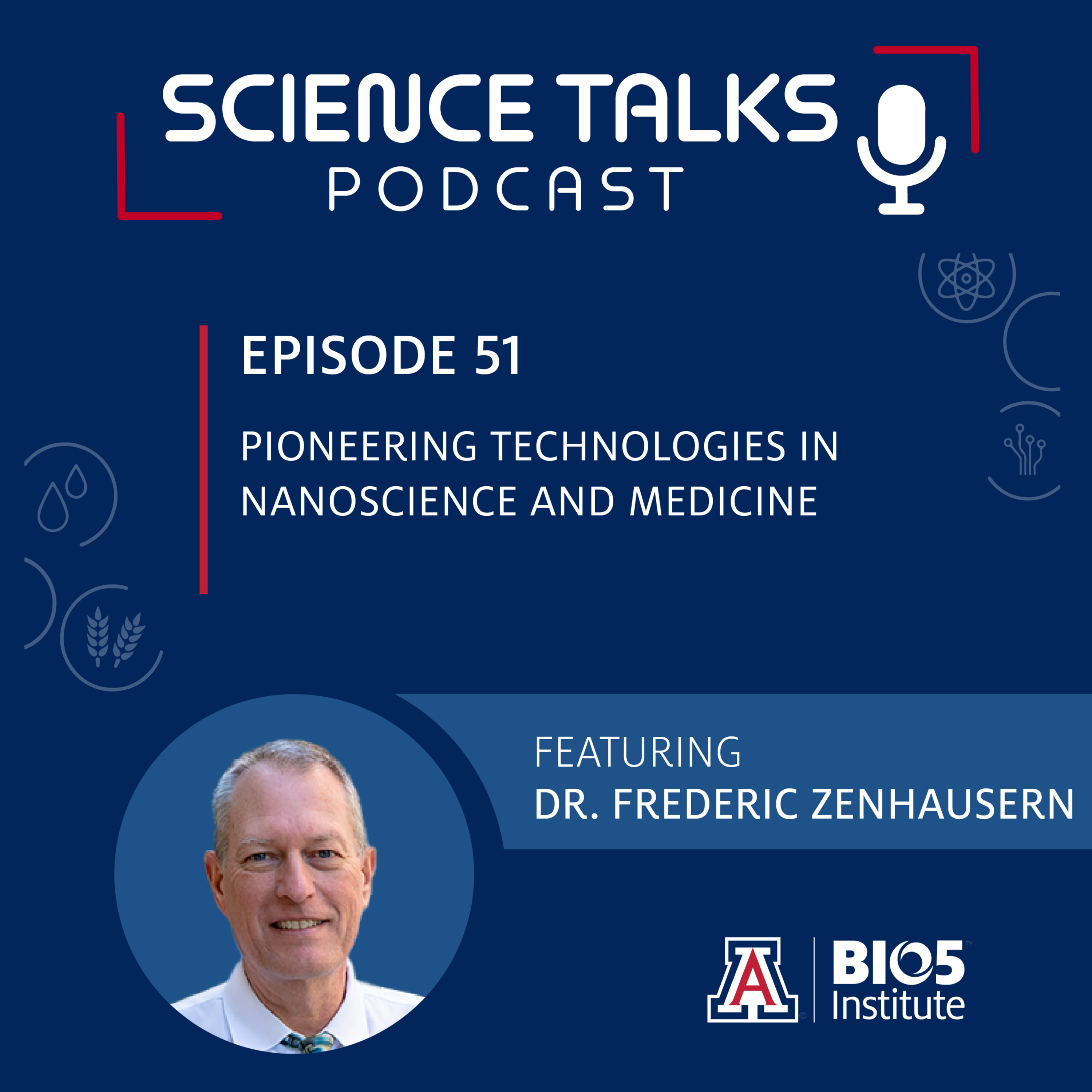
Science TalksEpisode 51: Pioneering technologies in nanoscience and medicineSee how an interdisciplinary scientific approach shaped the future of molecular diagnostics and personalized healthcare on a global scale. Amy Randall-Barber from the BIO5 Institute was joined on Science Talks by Dr. Frederic Zenhausern, director of the Center for Applied NanoBioscience and Medicine (ANBM) at the University of Arizona College of Medicine - Phoenix, among many other appointments in the college including in Basic Medical Science, Radiation Oncology, Biomedical Engineering, and Clinical Translational Science. Prior to coming to the university, Dr. Zenhausern co-founded and directed the Flexible Display Center at ASU MacroTechnology Works. He received his bachelor’s degree in biochemistry...
2024-02-2822 min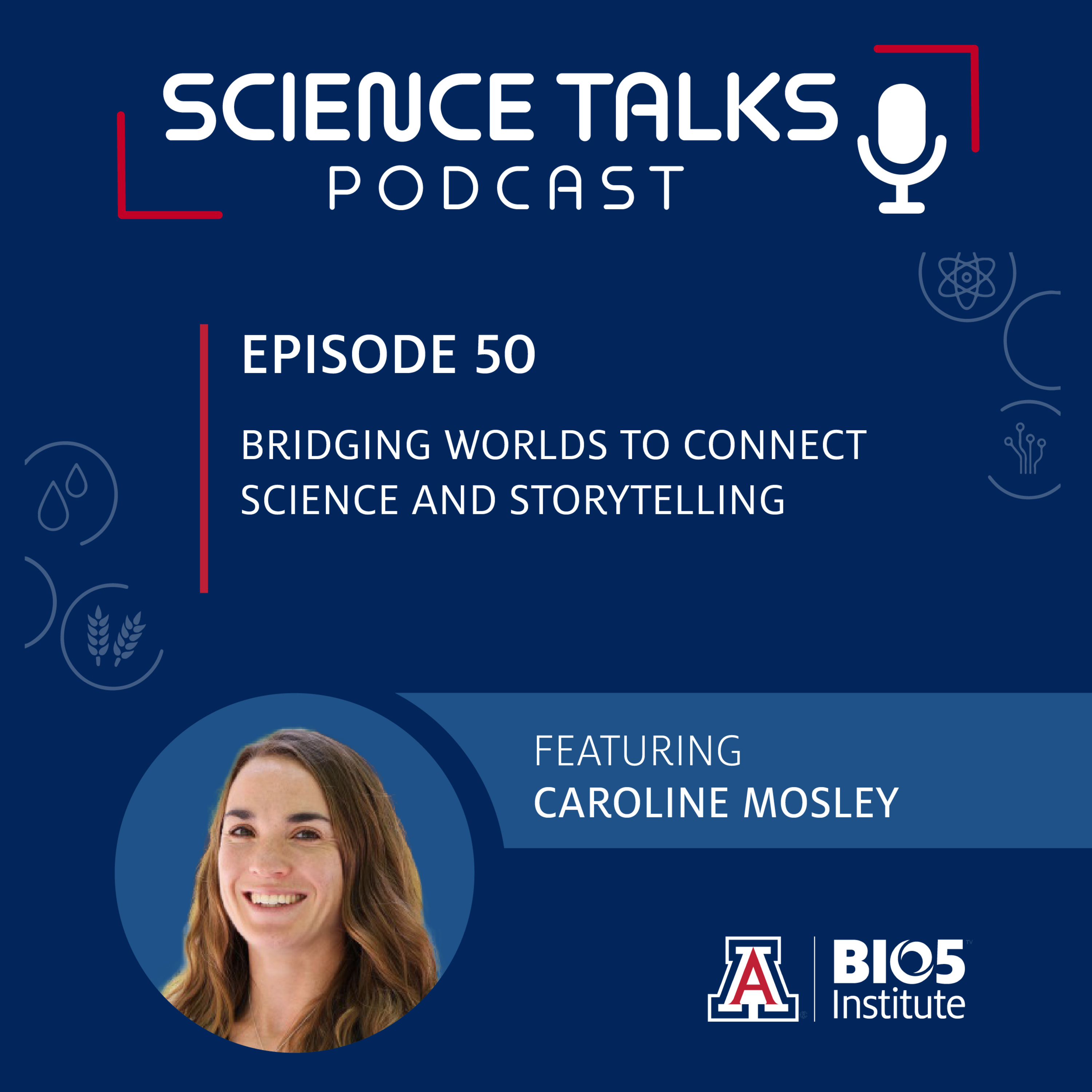
Science TalksEpisode 50: Bridging worlds to connect science and storytellingScience ignites curiosity about the natural world, leading people to explore and advocate for it. Amy Randall-Barber from the BIO5 Institute was joined on Science Talks by Caroline (Mosley) Bartelme, the senior manager of communications and content at the BIO5 Institute at the University of Arizona. Caroline's journey into science began with a fascination for ecosystems, studying invasive species in Milwaukee, Wisconsin. Later, she moved to Washington, DC, where she worked on protecting marine life and the environment. Now at the BIO5 Institute as the senior manager of communications and content, Caroline crafts compelling narratives that highlight the institute's...
2024-02-0712 min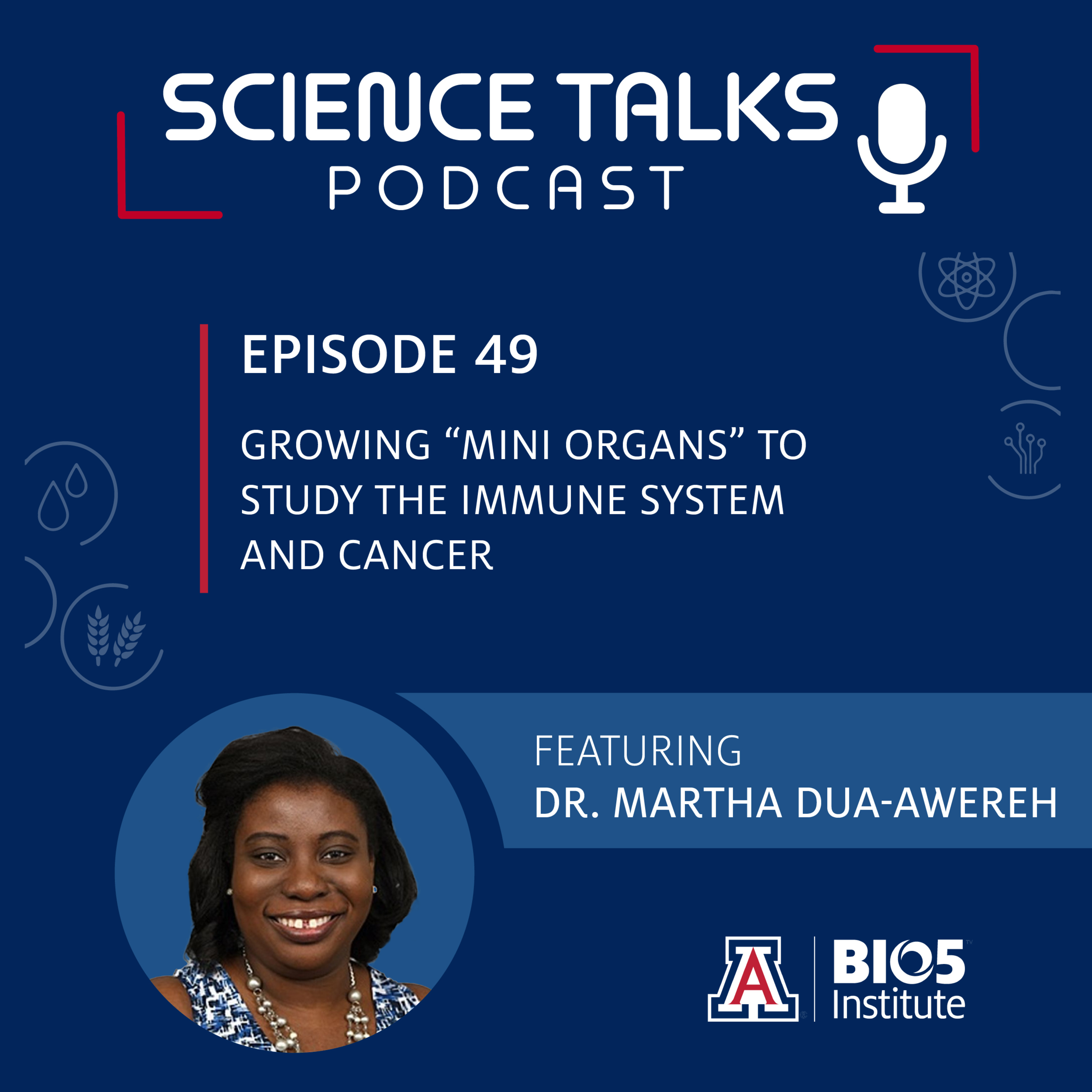
Science TalksEpisode 49: Growing “mini organs” to study the immune system and cancerCancer is an incredibly complex disease. To better understand how it interacts with the human body, researchers in the lab grow organoids, miniature three-dimensional tissue cultures derived from stem cells. Amy Randall-Barber from the BIO5 Institute was joined on Science Talks by Dr. Martha Dua-Awereh who uses organoids to study colorectal and pancreatic cancer with the Alfred Bothwell lab in the Department of Immunobiology at the University of Arizona College of Medicine — Tucson. Dr. Dua-Awereh earned her PhD from the Department of Systems Biology and Physiology at the University of Cincinnati School of Medicine and was a 2023 BIO5 Pos...
2024-01-1729 min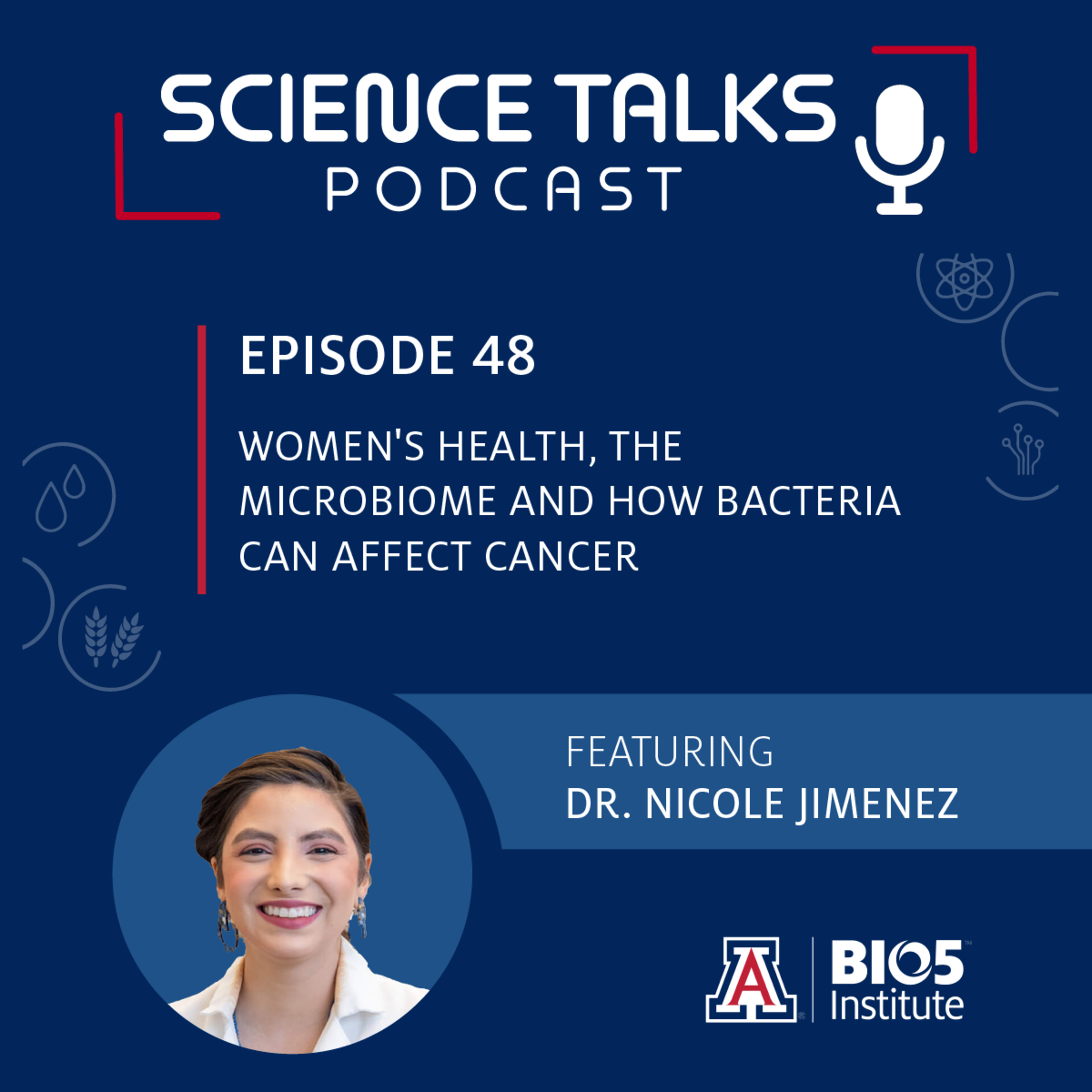
Science TalksEpisode 48: Women's health, the microbiome and how bacteria can affect cancerUnfortunately, many aspects of women’s health are underfunded and understudied. Better understanding women’s health conditions and microbiomes can help lead to better health outcomes and improve the quality of life. Amy Randall-Barber from the BIO5 Institute was joined on Science Talks by Dr. Nicole Jimenez, currently in the Melissa Herbst-Kralovetz lab, at the University of Arizona College of Medicine — Phoenix with a focus on women’s health research. She received her doctorate from Virginia Commonwealth University School of Medicine and was awarded two postdoctoral fellowships in 2023, one from the Community Foundation for Southern Arizona and the other from...
2024-01-1012 min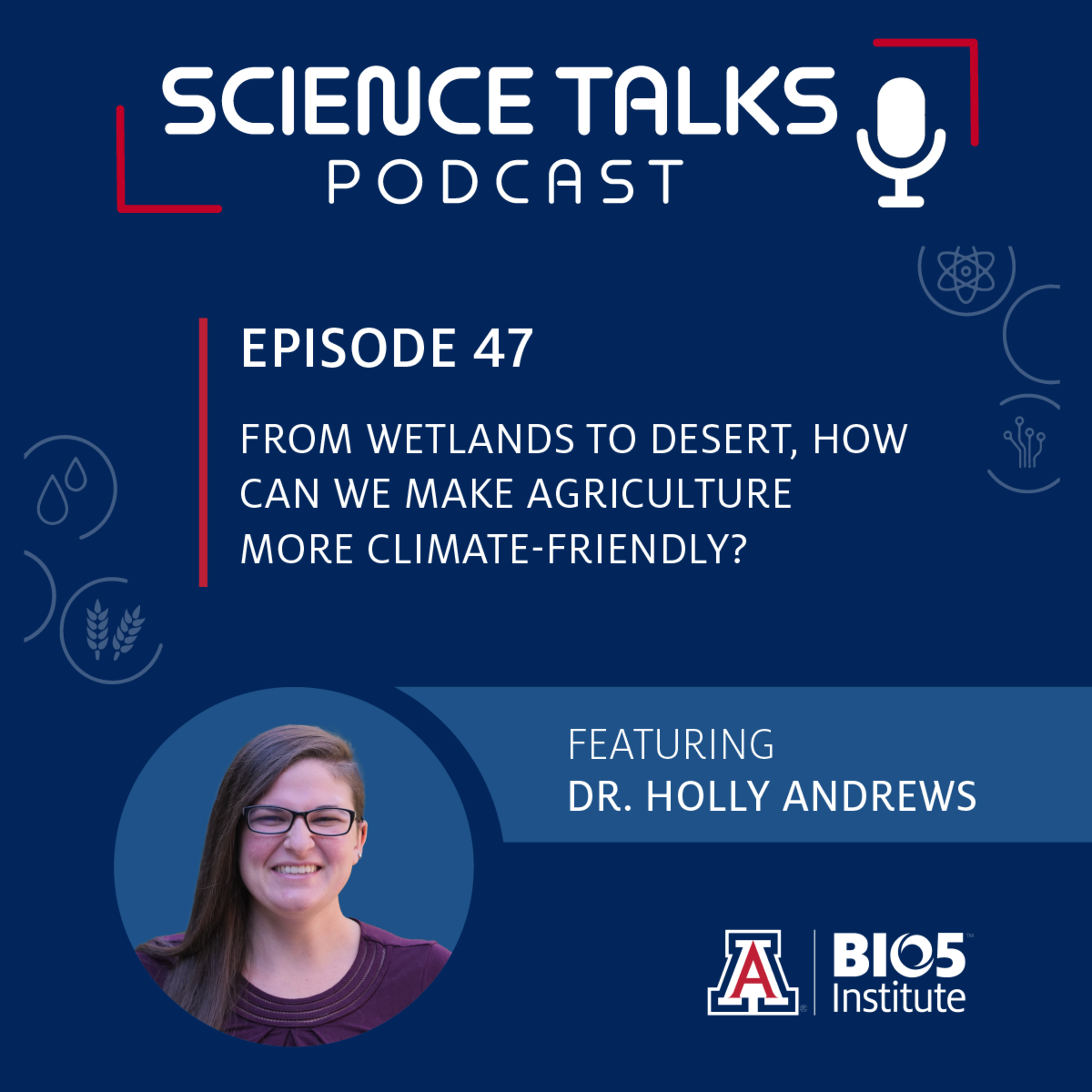
Science TalksEpisode 47: From wetlands to the desert, how can we make agriculture more climate-friendly?Adding fertilizers to our soil is not as simple as it seems. Plants use some of it, but unseen microbes metabolize fertilizers into gas, including nitrous oxide, a potent greenhouse gas that contributes to our changing climate. How can we not only understand how current agriculture affects our ecosystems, but also use that knowledge to advance new agricultural technology? Amy Randall-Barber from the BIO5 Institute interviewed Dr. Holly Andrews, a postdoctoral researcher working with both the Greg Barron-Gafford research group and Laura Meredith ecosystem genomics lab at the University of Arizona who is looking to answer both th...
2023-12-1226 min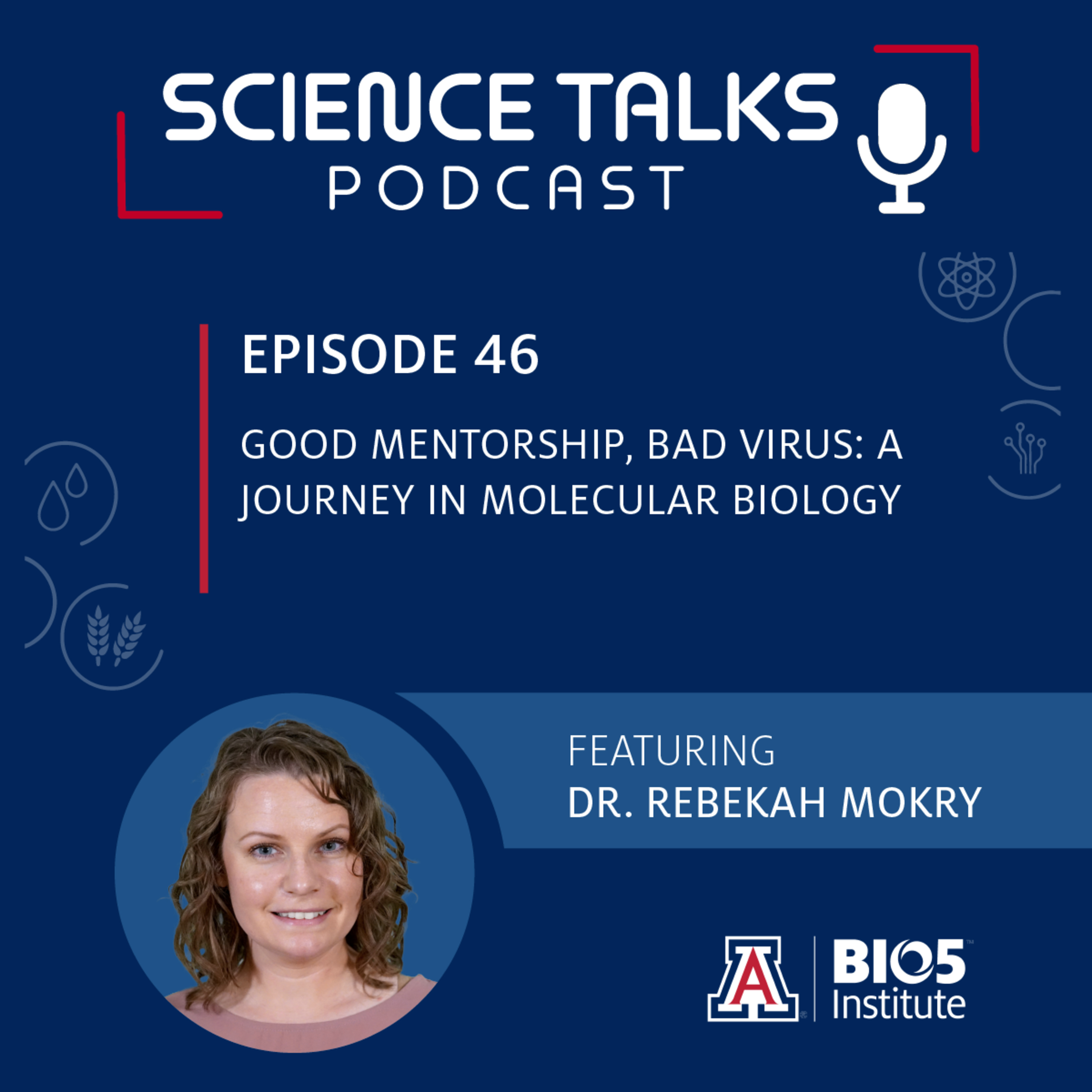
Science TalksEpisode 46: Good mentorship, bad virus: A journey in molecular biologyHuman cytomegalovirus (HCMV) is a herpesvirus that infects a majority of the world’s population. It’s a significant cause of viral induced birth defects and can cause complications in transplant patients or immunocompromised individuals. Amy Randall-Barber from the BIO5 Institute interviewed Dr. Rebekah Mokry, a postdoctoral research associate and 2023 BIO5 Postdoctoral Fellow in the Department of Immunobiology at the University of Arizona College of Medicine — Tucson. She received her PhD in microbiology and immunobiology at the Medical College of Wisconsin. Dr. Mokry currently works on HCMV replication and its modulation of cellular metabolism in the lab of Dr. Joh...
2023-11-0717 min
Overlooked: Women's Health Can't WaitRecurrenceFeaturing:Dr James Bentley from Nova Scotia Health.Alison Ross, Director of Knowledge Mobilization at Ovarian Cancer Canada.Jennifer Barton, Director of the Bio5 Institute at the University of Arizona.For more background on this episode, head to overlookedpod.com, where you can also get in touch with us.How you can support the show: Leave a review on Apple PodcastsHit the subscribe buttonSend this episode to someone who would also find it a meaningful listen
New to Overlooked? Welcome.Overlooked tells powerful stories a...
2023-10-1117 min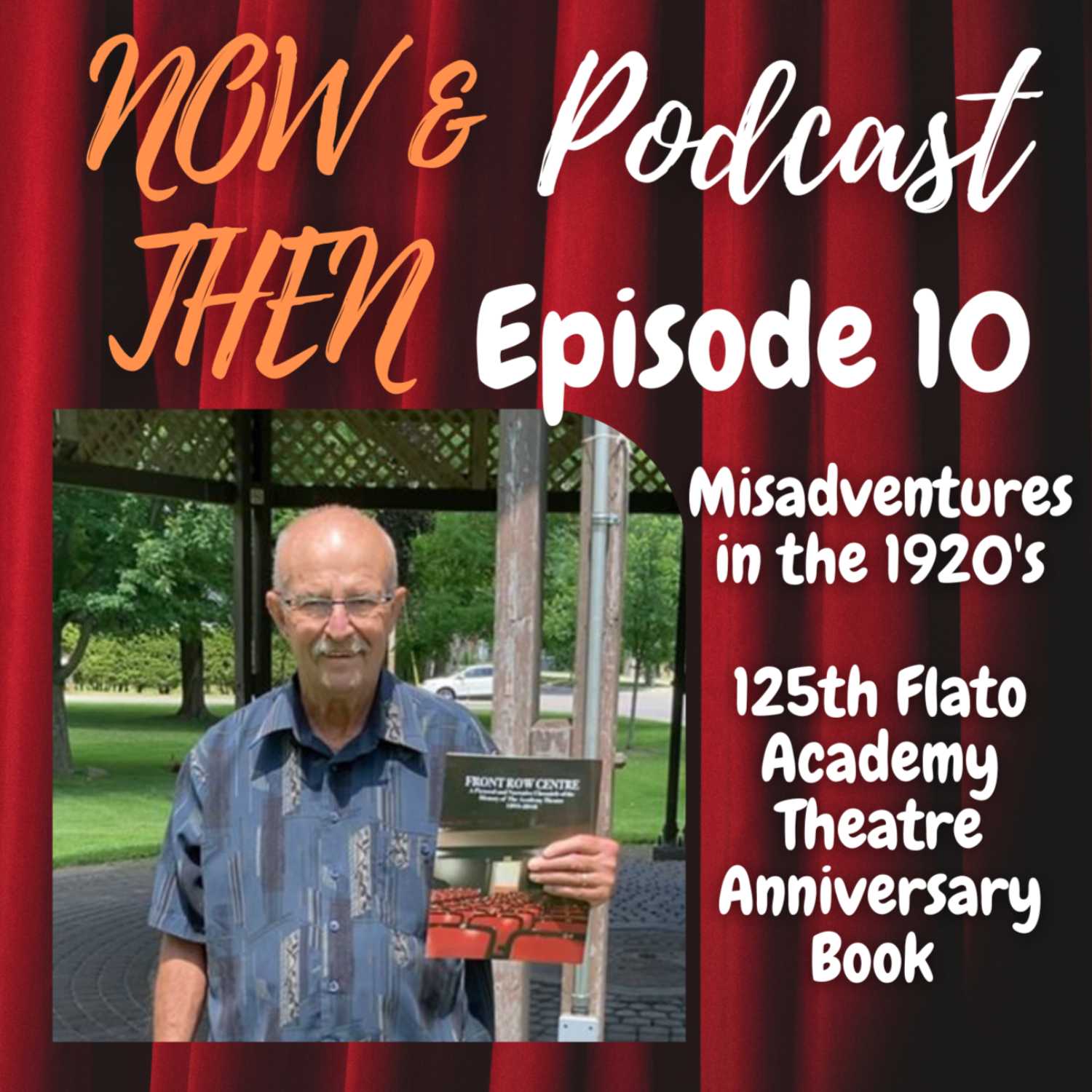
Now & ThenNow & Then Episode 10 - August 2023In this episode marking double digits for the podcast, we are going to be talking with our historian Ian about some misadventures faced 100 years ago, such as a train crash that caused the delay of a film reel in 1923 and how special effects were incorporated in silent films. We are also going to talk with him about how he got involved with the theatre and his journeys as a local historian. We also have a new guest, Jessie Kennedy, who had a big part in creating the book "Front Row Centre", a book on the Flato Academy Theatre and its...
2023-08-1029 min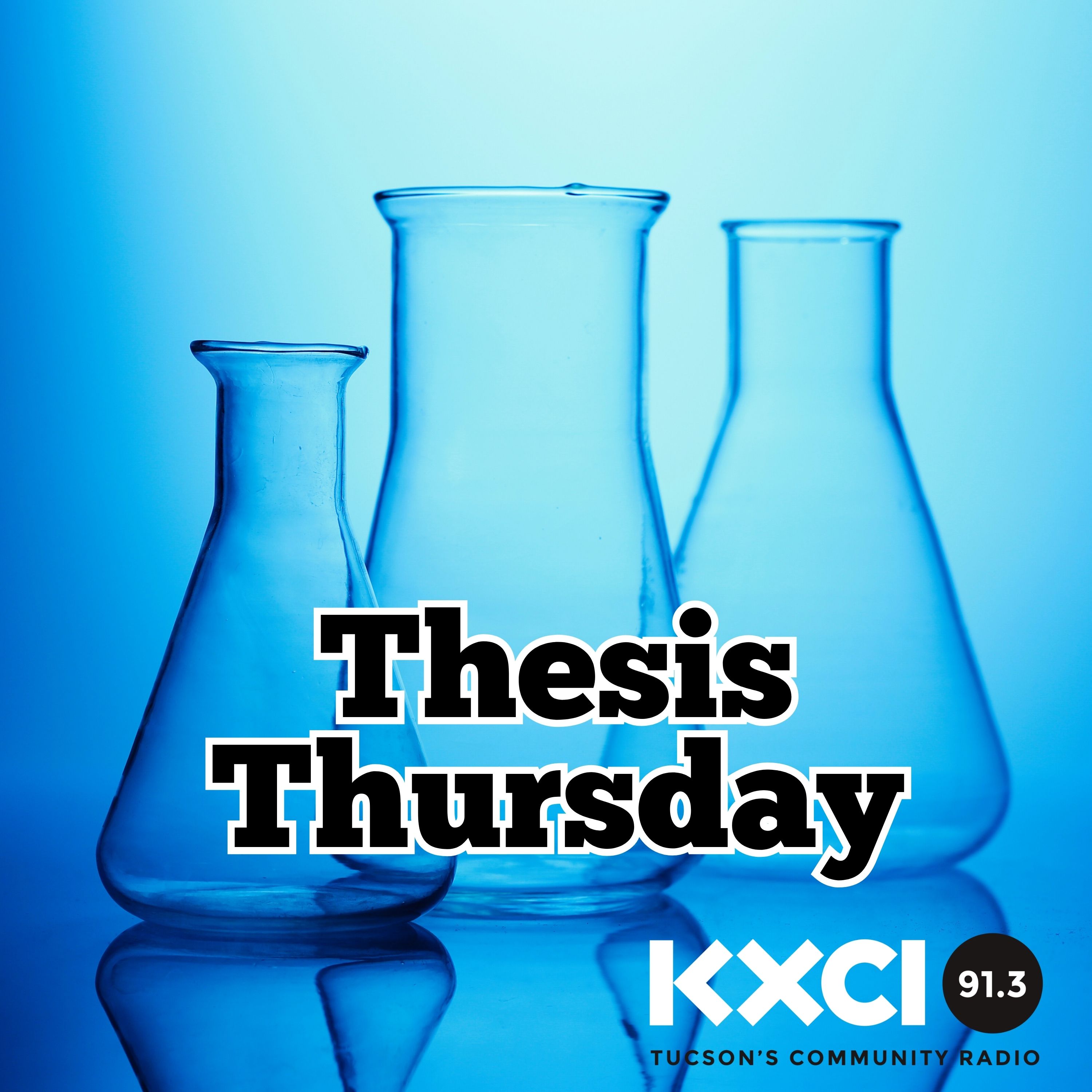
Thesis ThursdayAriel ChengMy name is Ariel Cheng and I am a junior majoring in Ecology and Evolutionary Biology with a minor in Theater. I have been working with Dr. Jana U'Ren at the BIO5 institute on campus for almost a year now. With her lab, I have been able to travel to Toolik Field Station, an isolated research station in Alaska, where I conducted fieldwork for my independent project! I am currently working on identifying the fungal community found in Alaskan wild berries. These berries benefit both indigenous people and native wildlife. With my project, I hope to raise more awareness about how...
2023-04-2003 min
Progress, Potential, and Possibilities Podcast / ShowDr. Felicia Goodrum, Ph.D.- University Of Arizona - Rational Virology Research For Human Health And Pandemic PreventionSend us a textDr. Felicia Goodrum, Ph.D. ( https://profiles.arizona.edu/person/fgoodrum ) is Interim Associate Department Head and Professor of Immunobiology, as well as Professor, BIO5 Institute, Cellular and Molecular Medicine, Molecular and Cellular Biology, Cancer Biology And Genetics Graduate Interdisciplinary Programs, at the University of Arizona. Dr. Goodrum earned her Ph.D. from Wake Forest University School of Medicine studying cell cycle restrictions to adenovirus replication and then trained as a postdoctoral fellow at Princeton University in the laboratory of Dr. Thomas Shenk studying human cytomegalovirus latency. Dr. Goodrum joined the faculty at...
2023-03-0652 min
Science TalksEpisode 45: The road to discovery is windingThe field of public health has become even more critical in the wake of the COVID-19 pandemic. Public health professionals must balance strategic thinking with compassionate thinking, and must truly be able to collaborate on the state, national, and global levels. Today, we are joined by physician and scientist Dr. Purnima Madhivanan. Dr. Madhivanan is an Associate Professor of Public Health, Medicine, Psychology, and Family and Community Medicine at the University of Arizona, as well as a member of the UA’s BIO5 Institute and Cancer Center. She is currently the Director of the MCH program as well as the...
2022-12-1933 min
Science TalksEpisode 44: See one, do one, teach one: The importance of paying it forward as scientistsWith metabolic processes being a complicated aspect of biology, it takes specially trained scientists with a respect for the multidisciplinary approaches to tackle the science and the innovation related to this area. Today, we are joined by Dr. Ashley Snider, an Associate Professor of Nutritional Science and Cancer Biology at the University of Arizona. Having received her Ph.D. in Pharmacology and Toxicology, Dr. Snider aims to understand more about fatty acids and their effect on inflammation and gastrointestinal diseases including colorectal cancer. She is a member of the BIO5 Institute and most recently was selected a 2022 Women of...
2022-12-0533 min
Science TalksEpisode 43: Epigenetics, asking questions, and why failure teaches us more than successEpigenetics, or the study of changes in organisms caused by modification of gene expression rather than alteration of the genetic code itself, is a very important and complex research interest. Currently, we are just now starting to understand how and when epigenetic information is passed from generation to generation through work done at the Mosher lab. At the Mosher lab, plant sciences are utilized to their full potential so advancement in the study of genetics/epigenetics can occur. Today, we are joined by fellow scientist Dr. Rebecca Mosher. Dr. Mosher is the Associate Director at the School of Plant...
2022-11-2133 min
Thesis ThursdayWill Peterson
Hi my name is Will Peterson! I’m a proud Tucson local born and raised up in the Foothills. I spent my first year of college at the University of Wisconsin-Madison where I realized I can’t stand the cold and transferred back home to the U of A. I am now in my fourth year here at the university studying Biomedical Science in the College of Ecology and Evolutionary Biology with a minor in Applied Biotechnology. I was super fortunate to join the Sutphin Lab in early 2021 where we use the model organism C. elegans to study the agin...
2022-11-0803 min
Science TalksEpisode 42: Neurological research extending the frontiers of scientific knowledgeNeurological Diseases are disorders that affect the brain and the nervous system, and include Parkinson’s disease, Dementia, and Alzheimer's disease. As researchers work diligently, the goal of better understanding these diseases and appropriate treatment becomes paramount. Trained physician and scientist Dr. Lalitha Madhavan is an Associate Professor of Neurology, and also a member of the Evelyn F Mcknight Brain Institute and BIO5 Institute at the University of Arizona. Her research merges the fields of Neuroscience and Stem Cell Biology to understand how the brain works and contribute towards the development of treatments for disorders such as Parkinson’s disea...
2022-11-0728 min
Science TalksEpisode 41: Embracing the mind-body connectionStress is a constant factor in the daily lives of many. BIO5 researchers are working to assess the risks affecting us when feeling overwhelmed and understand the connection between health and emotions. BIO5 member Dr. Esther Sternberg is a Professor of Medicine, Professor of Psychology, and the current Director of Research at the University of Arizona's center for integrative medicine. She is recognized by the national library of medicine as one of 339 influential women “who changed the face of medicine. Dr. Sternberg's research investigates the interconnected aspects of health such as the mind, body, and environment.
2022-10-2247 min
Science TalksEpisode 40: Reducing costs and promoting health with smartphone microscopyDr. Dongkyun Kang is an Assistant Professor of Optical Sciences, and Biomedical Engineering. Dr. Kang is currently leading an NIH-sponsored research project for developing a smartphone confocal microscope and diagnosing Kaposi's sarcoma in Uganda. Through hard research and development, Dr. Kang's lab just might create the next big medical technology.
Links:
BIO5 Institute: https://bio5.org/
$1 Million Project to Fight Vision Loss: https://www.ophthalmologytimes.com/view/university-of-arizona-engineer-leads-1-million-project-to-fight-vision-loss
Mobile Health Microscope: https://www.fic.nih.gov/News/GlobalHealthMatters/january-february-2020/Pages/mobile-health-innovative-microscope-enables-early-cancer-diagnoses.aspx?fbclid=IwAR2rNDfUfYpTi4sITJDq_oIRM_wJ7HH1U6...
2022-10-1029 min
Science TalksEpisode 39: PHighting PHthalate exposure to improve PHertilityInfertility is the inability to get pregnant after one year of trying to conceive. It is estimated that 15% of couples will have trouble conceiving, and globally, nearly 50 million couples experience infertility every year. Many factors can contribute to female infertility, including exposure to endocrine-disrupting chemicals (EDC), which are highly present in many of our everyday products. Reproductive toxicologist Dr. Zelieann Craig is working towards reducing the incidence of infertility by improving our understanding of how these chemicals interact with the female reproductive system. Dr. Craig is a BIO5 member, associate professor of physiological sciences, as well as the assistant...
2022-08-0122 min
Science TalksEpisode 38: Deciphering mental illness and supporting women in medicine and scienceNeuropsychiatric illnesses are mental disorders which include schizophrenia, bipolar disorder, and major depressive disorder. These illnesses are rooted in identifiable problems within the brain. They are complex conditions whose origins aren’t well-understood, and they are a leading cause of disability in the United States. Physician-scientist Dr. Amelia Gallitano is the Director of Women in Medicine and Science at the UArizona College of Medicine - Phoenix, as well as a professor of basic medical sciences, psychiatry, and neuroscience, and is a member of the BIO5 Institute. She’s a board-certified psychiatrist who studies how the environment interacts with genes to i...
2022-07-1927 min
Science TalksEpisode 37: Tackling COVID-19 with research and science communicationInfectious diseases are the leading cause of death in developing countries and ignite grand challenges like pandemics. BIO5 researchers are working to develop better prevention, diagnostic, and treatment strategies to decrease the global burden of these diseases. BIO5 member Dr. Deepta Bhattacharya is a professor of immunobiology, and associate professor of surgery, genetics, and cancer biology. Dr. Bhattacharya merges stem cell biology and immunology to understand the development of white blood cells and to devise novel strategies to fight illnesses such as COVID-19, influenza, and Dengue virus.
2022-07-0428 min
Science TalksEpisode 36: Outshining the sun to squash skin cancerResidents of the sunniest state – Arizona – are no strangers to ample sunshine. While sun exposure is beneficial to our wellbeing, it’s also a major cause of skin cancer, the most common type of cancer in the U.S. At least 5 million people in our country are treated for skin cancer annually, resulting in more than $8 billion in medical expenses. Physician-scientist Dr. Clara Curiel-Lewandrowski is a professor of medicine and Director of the Multidisciplinary Cutaneous Oncology Program at the UArizona Skin Cancer Institute. Dr. Curiel-Lewandrowski is also the interim chief of the Division of Dermatology, member of both the BIO5 In...
2022-06-2032 min
Science TalksEpisode 35: Big tools for big dataSome of science’s most difficult challenges like solving world hunger and curing disease involve more than just traditional science fields such as plant and cell biology. Data science brings together computational, statistical, and mathematical techniques to expand our knowledge from big datasets collected from the bench, field or computer. Handling these large datasets can pose a challenge, especially to researchers who might not be familiar with or have the infrastructure to handle big data. Nirav Merchant is the co-principal investigator for CyVerse and Director of the UArizona Data Science Institute. Nirav is an expert in developing computational platforms an...
2022-06-0926 min
Science TalksEpisode 34: Regenerating hearts and overcoming failureHeart disease is the leading cause of death in both the U.S. and world. To lessen this large disease burden, researchers are actively investigating why and how people develop heart disease. Cardiovascular researcher Dr. Jared Churko takes a single-cell approach to studying the mechanisms of heart disease. Dr. Churko is an assistant professor of cellular and molecular medicine, physiological sciences, genetics, and biomedical engineering, as well as BIO5 member and Director of the iPSC Core.
2022-05-2328 min
Erzähl's mir, RWTH!Dr. Benjamin Daniels über die Entwicklung einer ökologisch nachhaltigen Kulturlandschaft im Rheinischen RevierDas Rheinische Revier hat viele wirtschaftlich ungenutzte Grünflächen, die als Grüne Infrastruktur das Kapital der Region bilden. In der letzten Folge der Staffel sprechen wir mit Dr. Benjamin Daniels vom Institut für Umweltforschung der RWTH Aachen darüber, wie diese Infrastruktur geschützt und genutzt werden kann, um einen Beitrag zum Artenschutz zu leisten oder uns vor Hitzeextremen, Hochwasser oder Krankheitserregern zu schützen. Wir sprechen über die Entwicklung einer ökologisch nachhaltigen Kulturlandschaft, die Biodiversitätskrise versus Klimakrise und was das Rheinische Revier als großes As im Ärmel hat, um die Herausforderungen der Zukunft zu meistern...
2022-05-1234 min
Science TalksEpisode 33: Tackling traumatic brain injury head-onTraumatic brain injury (TBI) is the leading cause of death and disability for individuals under age 44 with an estimated 1.7 million cases occurring in the U.S. every year, and concussion is dubbed a silent epidemic. TBI dismantles circuits in the brain, leading to short and long-term cognitive dysfunction. Dr. Kaveh Laksari utilizes biomechanics to study the underlying processes of TBI and model the injury to aid in prevention and accurate diagnosis. Dr. Laksari is an assistant professor of biomedical engineering, aerospace-mechanical engineering, and neuroscience, as well as a BIO5 member.
2022-05-0925 min
Science TalksEpisode 32: Sleep, inflammation, and COVID-19Breathing, sleeping, and good health go hand in hand. People with lung diseases and allergies often have problems getting a quality, healthy night’s sleep which in turn can lead to further health challenges. Physician-scientist Dr. Sairam Parthasarathy is a BIO5 member who works at the intersection of chronic illness and sleep. Dr. Parthasarathy is a professor of medicine and clinical translational sciences at the University of Arizona, as well as the College of Medicine’s Division Chief of Pulmonary, Allergy, Critical Care and Sleep Medicine. He’s also the medical director of the Banner – University Medical Center Tucson Center f...
2022-04-2539 min
Science TalksEpisode 31: Vertical farming: a sustainable solution to feeding more with lessSustainable agriculture is quickly becoming the wave of the future as we find ways to feed a world of 10 billion by 2050. Our BIO5 researchers are developing novel solutions that enable the production of more food with less use of resources. Using the framework of sustainable agriculture, Dr. Joel Cuello is looking up for answers in the form of vertical farming. Dr. Cuello is a professor of agricultural-biosystems engineering, applied biosciences, and arid lands resources sciences, as well as a BIO5 member.
2022-04-1121 min
Science TalksEpisode 30: Where blood flow meets brain diseasesCertain diseases like Alzheimer’s and high blood pressure are known to alter the link between brain activity and blood flow changes in the brain, leading to improper blood flow delivery to brain cells. This eventually leads to the death of brain cells and cognitive decline. Dr. Paulo Pires, assistant professor of physiology and surgery and BIO5 member, studies how blood flow to the brain changes between healthy and disease states, with an eye on possible therapies that can improve blood flow to mitigate disease.
2022-03-2829 min
Science TalksEpisode 29: Bringing hope to pediatric transplant patients and their familiesTreatment for patients with blood cancers like leukemia or lymphoma may include a bone marrow transplant to replace unhealthy tissue to increase odds of recovery and survival. Transplants can be lifesaving but are complex and challenging, especially for children. Physician-scientist Dr. Emmanuel Katsanis not only performs transplantation, but also actively researches tumor and transplant immunology. Dr. Katsanis is a professor of pediatrics, medicine, immunology, and cancer biology, and is a BIO5 member. He discusses his three decades of expertise in the lab and clinic as the Director of the Blood and Marrow Transplant Program and Division Chief of Pediatric...
2022-03-1431 min
Science TalksTitle: Episode 28: Seamless wearable and implantable devices to support our livesFrom smart watches to pacemakers, technology is essential in helping us lead happy, healthier lives. Because this tech can be bulky and a little intimidating at times, creating inconspicuous devices that carry a big impact is at the forefront of tomorrow's life-changing innovations. Dr. Philipp Gutruf, assistant professor of biomedical engineering and BIO5 member, specializes in creating new kinds of wearable and implantable devices that seamlessly integrate with living systems to ultimately change the landscapes of health diagnostics and neuroscience.
2022-02-2828 min
Science TalksEpisode 27: Little sensors solving big problemsBiomarkers are measurable substances inside our bodies that give scientists and medical professionals a hint that we might have a certain disease, like cancer or Alzheimer’s, or have been exposed to a toxic chemical. Biomarkers are typically measured in blood samples or biopsies, which can range from a minimally invasive sample taken from the skin or a more invasive sample from within the body. Dr. Judith Su, the director of the University of Arizona’s Little Sensor Lab, is looking to change the way we detect biomarkers with her tiny, non-invasive optical sensors. Dr. Su is an assistant prof...
2022-02-1427 min
Science TalksEpisode 26: Inspirational female leaders in STEMDescription: Women make up nearly half of the U.S. workforce, but only 27% of the STEM workforce. The University of Arizona and the BIO5 Institute are working to combat this gender inequity, and Dr. Betsy Cantwell, Senior Vice President for Research and Innovation, and Dr. Jennifer Barton, BIO5's director, are leading the charge. Cantwell and Barton share tips for succeeding as a woman in STEM, particularly engineering, as well as how they navigate the intersection between STEM and business to bring valuable innovations to their stakeholders.
2022-01-1838 min
Science TalksEpisode 25: Increase your ZZZs with three simple tipsAbout one-third of Americans aren't getting the right amount of shut-eye on a daily basis - but how many hours should you really be getting? Can you make up for poor sleep with a nap? How can you fall asleep - and stay asleep? Dr. Michael Grandner, Director of the UArizona Sleep and Health Research Program and Director of the Behavioral Sleep Medicine Clinic at the Banner-University Medical Center, gives us the secrets to a better night's sleep. The professor of several disciplines also tells us why good sleep is not just important for our mood, but it's essential...
2022-01-0435 min
Science TalksEpisode 24: Female education and empowermentHormones like estrogen and progesterone typically get a bad rap, as they’re often blamed for heightened emotional expression during menstruation, pregnancy, and postpartum. Dr. Alicia Allen is changing the way we think and talk about female reproductive hormones. The assistant professor of family and community medicine, clinical translational sciences, and public health shares how her epidemiological and intervention studies are geared towards educating, empowering, and helping women combat their addictions.
2021-12-0635 min
Science TalksEpisode 23: Culture countsThe University of Arizona is on the land and territories of Indigenous Peoples, and today, Arizona is home to 22 federally recognized tribes, with Tucson being home to the O'odham and the Yaqui. There is a disproportionate burden of contaminant exposure in underserved populations like Native Americans, and because their culture and traditions are closely woven with the environment, special strategies must be used to study and help these groups. Dr. Paloma Beamer, professor of public health, research scientist in the Asthma and Airway Disease Research Center, and director of the Community Engagement Core at the Southwest Environmental Health Sciences...
2021-11-2229 min
Science TalksEpisode 22: Innovation happens one breath at a timeOne in every 13 Americans suffers from asthma. UArizona Regents’ Professor, Dr. Fernando Martinez, also a former director of the BIO5 Institute, describes how witnessing his mother’s asthma attack ignited his passion to research and treat patients with this condition. The Director of the Asthma & Airway Disease Research Center shares what the buzzwords “transdisciplinary” and “innovation” mean to him, and how he keeps both of these factors in mind when studying genetic and environmental interactions when thinking about potential treatments and a cure for asthma.
2021-11-0833 min
Science TalksEpisode 21: Racing cars, hunting microbes, and mentoring diverse scientistsMicrobes such as bacteria, plants and fungi far outnumber the human population on Earth. BIO5 member Dr. Paul Carini shares how these microscopic organisms are essential to our health, as well as how they support life on Earth through their roles in the carbon cycle and beyond. Carini, an assistant professor of soil/subsurface microbial ecology genetics and plant sciences also discusses the importance of supporting diversity in STEM by not only providing opportunities for underrepresented groups, but by tailoring mentoring to each individual.
2021-10-2528 min
Science TalksEpisode 20: Tortoises, genetics, and core facilitiesTransdisciplinary research unites researchers from different backgrounds to integrate and move beyond discipline-specific approaches to address today’s grand bioscience and biomedical challenges. Dr. Taylor Edwards, clinical manager and development scientist at the University of Arizona Genetics Core, shares how the UAGC core facility brings together researchers and samples across the university to tackle projects spanning COVID-19, environmental science, and more. Though the projects vary, Edwards says that a common theme of DNA unites them.
2021-10-1129 min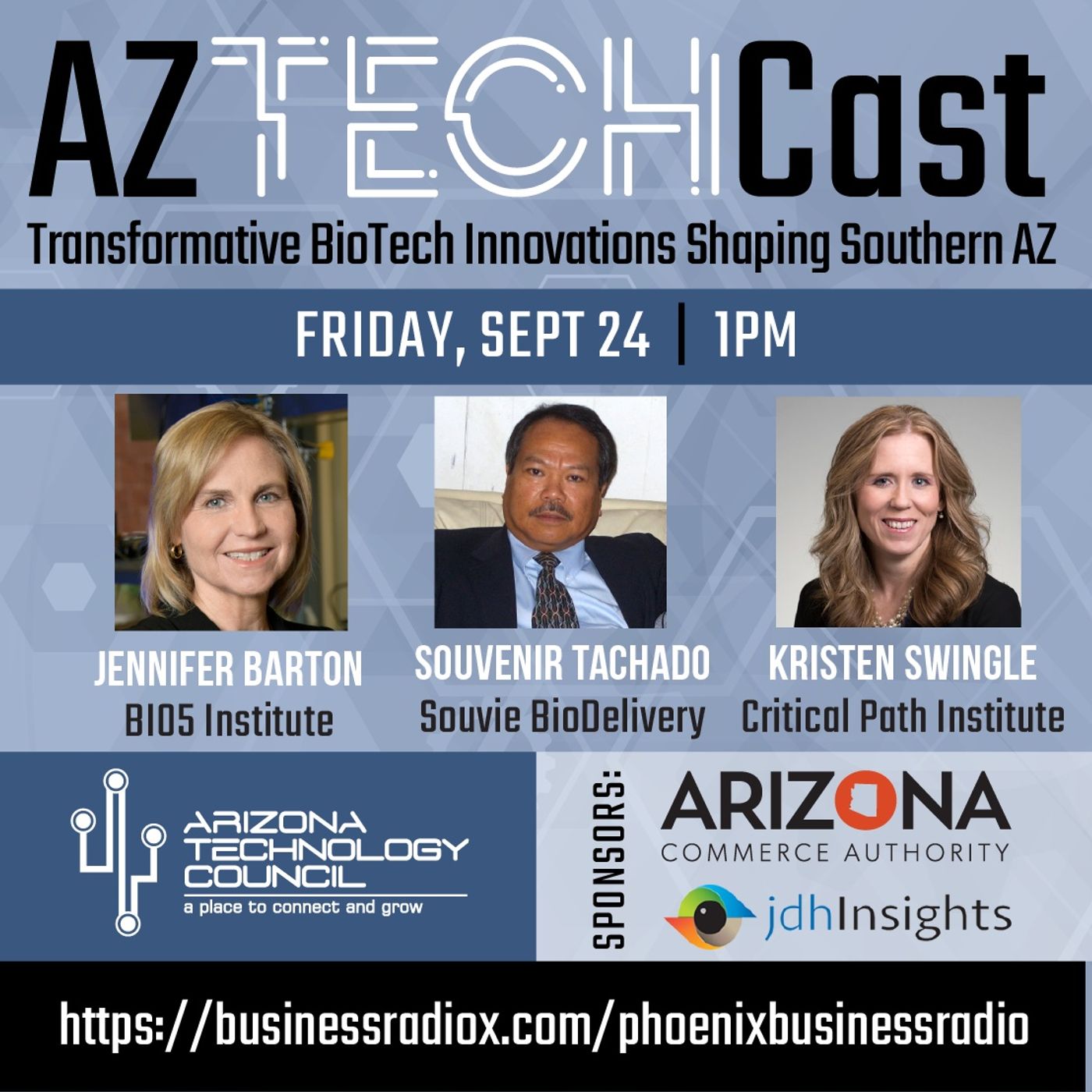
Phoenix Business RadioTransformative BioScience Innovations Shaping Southern Arizona E18Transformative BioScience Innovations Shaping Southern Arizona E18 In this episode of AZTechCast, the official podcast of the Arizona Technology Council, accomplished bioscience leaders from the BIO5 Institute at The University of Arizona, Souvie BioDelivery and Critical Path Institute joined Council president and CEO, Steve Zylstra, to discuss the innovative bioscience innovations shaping Southern Arizona. These [...]
2021-09-2956 min
AZ TechCastTransformative BioScience Innovations Shaping Southern Arizona E18Transformative BioScience Innovations Shaping Southern Arizona E18 In this episode of AZTechCast, the official podcast of the Arizona Technology Council, accomplished bioscience leaders from the BIO5 Institute at The University of Arizona, Souvie BioDelivery and Critical Path Institute joined Council president and CEO, Steve Zylstra, to discuss the innovative bioscience innovations shaping Southern Arizona. These [...]
2021-09-2956 min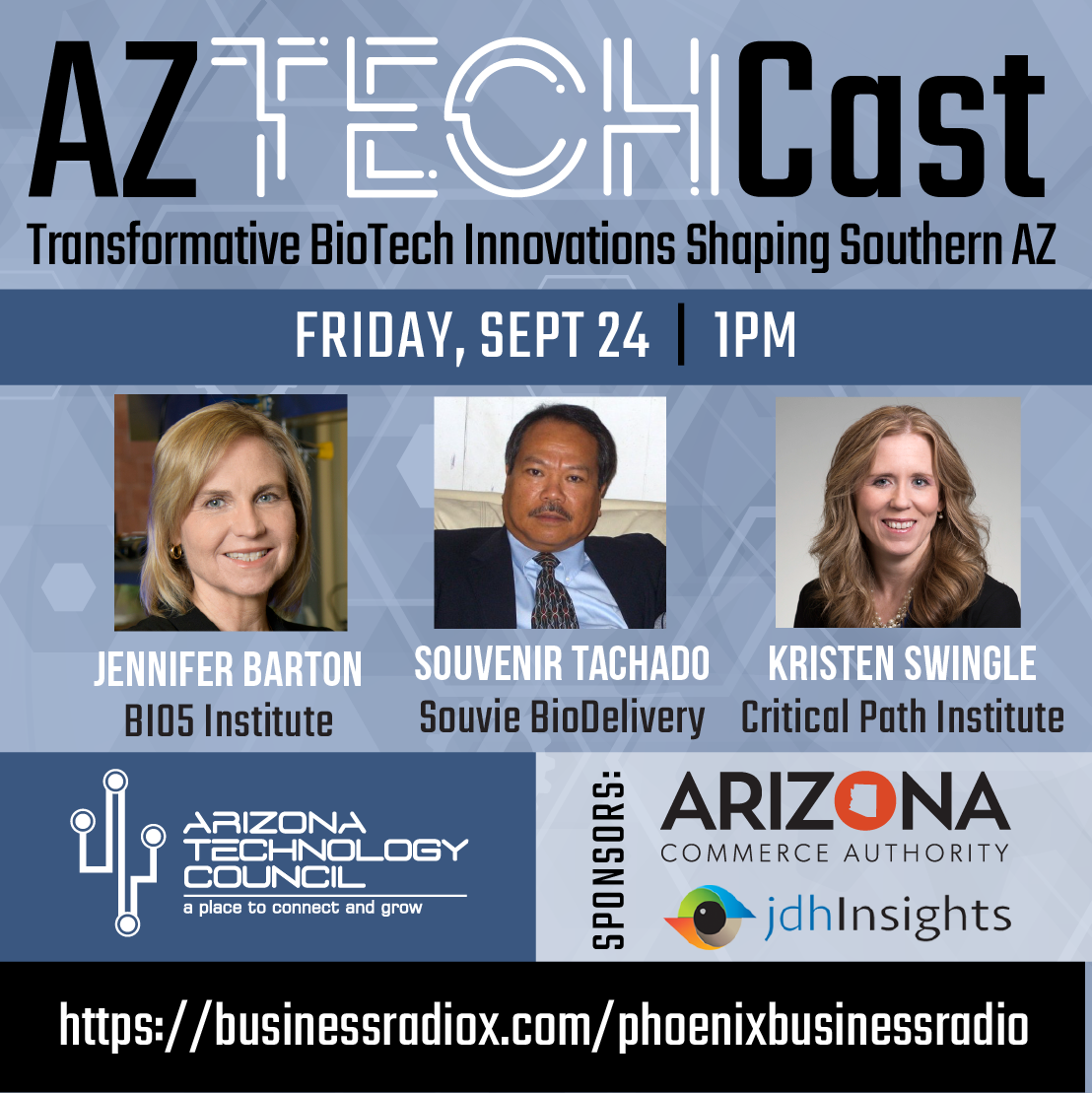
AZ TechCastTransformative BioScience Innovations Shaping Southern Arizona E18Transformative BioScience Innovations Shaping Southern Arizona E18 In this episode of AZTechCast, the official podcast of the Arizona Technology Council, accomplished bioscience leaders from the BIO5 Institute at The University of Arizona, Souvie BioDelivery and Critical Path Institute joined Council president and CEO, Steve Zylstra, to discuss the innovative bioscience innovations shaping Southern Arizona. These […]
The post Transformative BioScience Innovations Shaping Southern Arizona E18 appeared first on Business RadioX ®.
2021-09-2900 min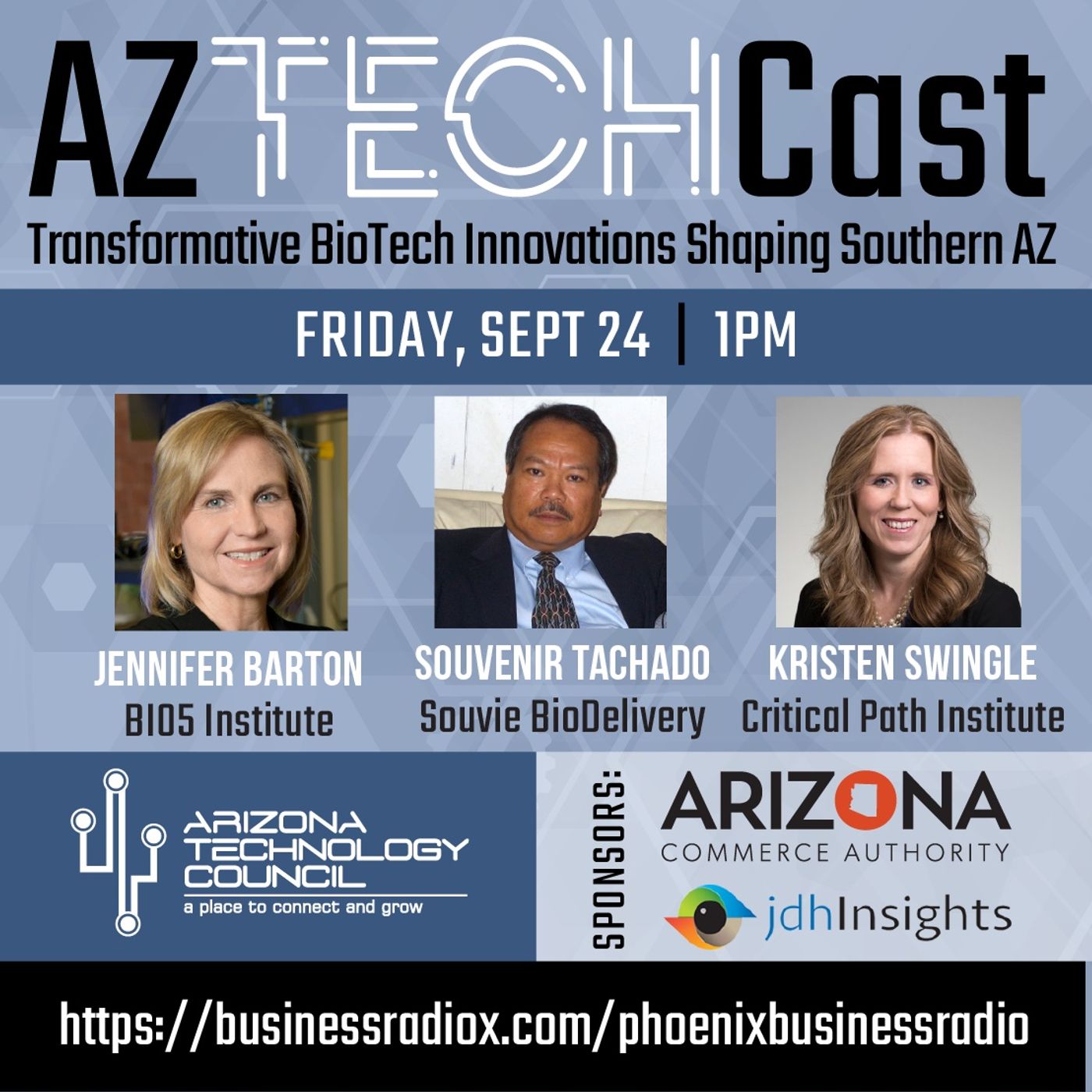
Phoenix Business RadioTransformative BioScience Innovations Shaping Southern Arizona E18Transformative BioScience Innovations Shaping Southern Arizona E18 In this episode of AZTechCast, the official podcast of the Arizona Technology Council, accomplished bioscience leaders from the BIO5 Institute at The University of Arizona, Souvie BioDelivery and Critical Path Institute joined Council president and CEO, Steve Zylstra, to discuss the innovative bioscience innovations shaping Southern Arizona. These [...]
2021-09-2956 min
AZ TechCastTransformative BioScience Innovations Shaping Southern Arizona E18Transformative BioScience Innovations Shaping Southern Arizona E18 In this episode of AZTechCast, the official podcast of the Arizona Technology Council, accomplished bioscience leaders from the BIO5 Institute at The University of Arizona, Souvie BioDelivery and Critical Path Institute joined Council president and CEO, Steve Zylstra, to discuss the innovative bioscience innovations shaping Southern Arizona. These [...]
2021-09-2956 min
Science TalksEpisode 19: Drugging the “undruggable” targets in GI cancersGastrointestinal cancers collectively represent one of the greatest public health challenges, accounting for more than one-quarter of all global cancer cases and more than 35% of all cancer-related deaths. Many of these cancers, including pancreatic and biliary, have been historically hard to treat. Dr. Rachna Shroff, Associate Dean of clinical and translational research and chief of GI medical oncology at the UArizona Cancer Center, discusses her genomic profiling approach to developing personalized treatments for cancer patients. She also shares how she supports other researchers and clinicians in connecting their findings at the bench and bedside to discover new therapies through...
2021-09-2729 min
Science TalksEpisode 18: Pathogens of the female reproductive tractBacteria were among the first forms of life on earth, and while some strains cause infection or spoil food, others are essential to providing nutrients to plants, fermenting foods, and supporting our gut and reproductive health. Dr. Melissa Herbst-Kralovetz, associate professor of basic medical sciences, as well as obstetrics and gynecology at the College of Medicine – Phoenix, explains how the delicate balance between “good” and “bad” bacteria affect the health of the female reproductive tract. She shares how her research will ultimately help to develop better diagnostics, preventatives and treatments for sexually transmitted infections, gynecological cancer, and more.
2021-09-1329 min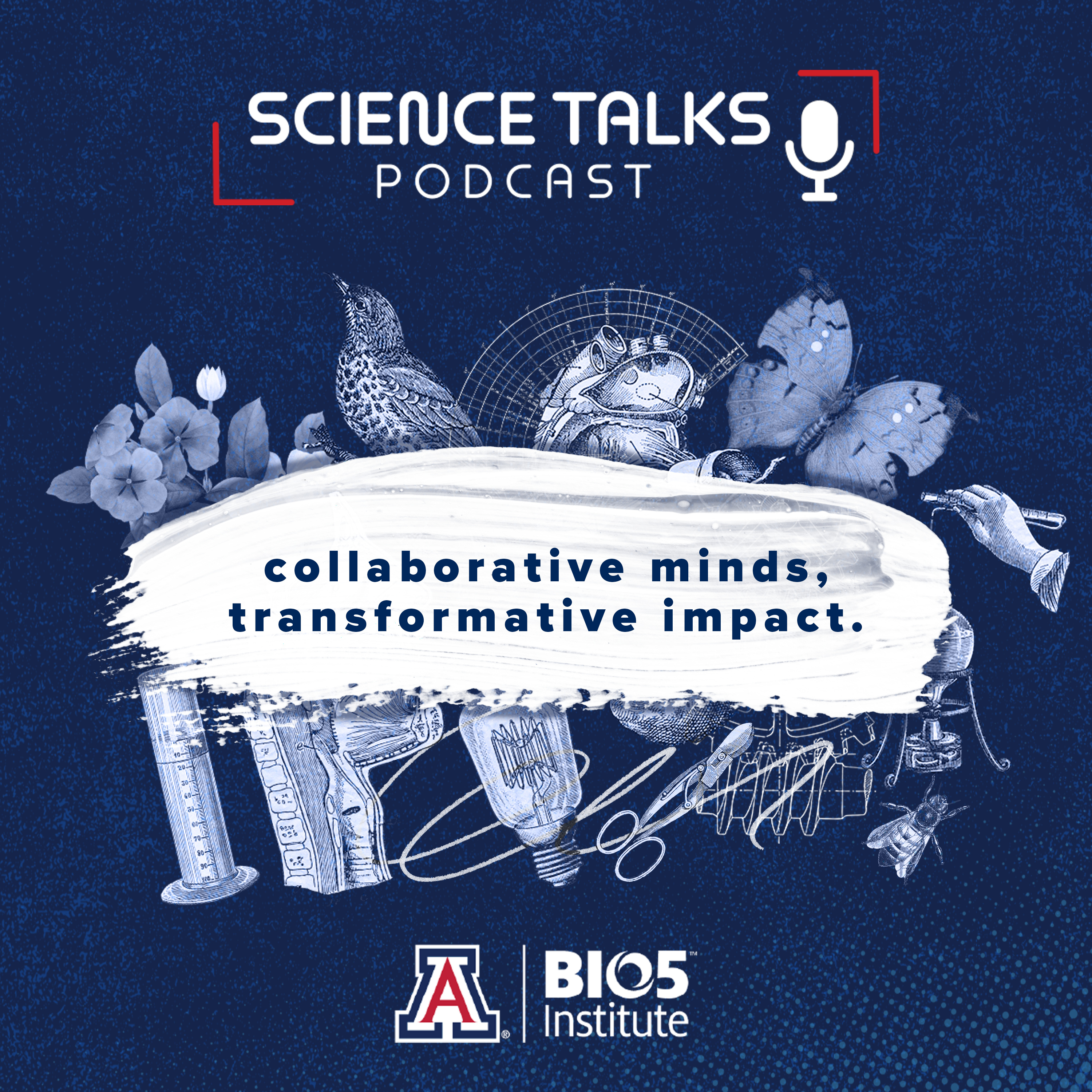
Science TalksEpisode 17: From laboratory research to science communicationPursuing a doctorate in STEM doesn’t mean one is destined for a life at the lab bench. Dr. Brittany Uhlorn, coordinator of marketing and communications at the BIO5 Institute, shares why she transitioned to science communication after obtaining a doctorate in cancer biology. She also discusses how her training as a bench scientist benefits her new career writing stories for lay audiences and co-hosting Science Talks.
2021-08-3032 min
Science TalksEpisode 16: Predicting drug toxicity and flood risk with data scienceSome of the biggest challenges in STEM are so large that they can’t be addressed at the lab bench. Dr. Walter Piegorsch, director of statistical research & education at the BIO5 Institute and professor of mathematics and public health shares how he uses the power of data science and informatics for environmental and health risk assessment.
2021-08-1632 min
Science TalksEpisode 15: Tackling neuro-infectious diseases as a physician-scientistEver wonder why pregnant people shouldn’t scoop kitty litter? They might come into contact with toxoplasma gondii, a parasite that infects up to one-eighth of the world’s population that can cause lifelong infection in the central nervous system. Dr. Anita Koshy, associate professor of neurology and immunobiology and BIO5 member, talks about her research to better understand this pesky parasite. She also shares her journey to becoming a physician-scientist, and how she spends her time away from the clinic and lab.
2021-08-0231 min
Science TalksEpisode 14: Transforming through BIO5 engagementBy engaging students in hands-on experiential learning and providing them with a world-class education, these budding young minds can blossom into productive members of the STEM workforce. Ryan Hunt has taken advantage of several opportunities provided by the BIO5 Institute, including the KEYS high school internship program, undergraduate research, and a student job with the public affairs team. Hunt shares how each role within BIO5 has impacted him both personally and professionally. He also talks about his love for art and science, and how the two can be combined to communicate science with researchers and the public alike.
2021-07-1921 min
Science TalksEpisode 13: Uncovering the role of soil microbes on climate changeMicrobes living in the soil play a vital role in global photosynthesis by producing and consuming trace gasses in our atmosphere. Dr. Laura Meredith, assistant professor of ecosystem genomics, genetics, global change, and hydrology and atmospheric sciences, discusses her work to better understand the relationship between microbes, plants, and the atmosphere. She talks about her current field work in Alaska to decipher how this relationship impacts climate change. Dr. Meredith also shares how she thrives as a woman in STEM and how she supports her fellow female colleagues and students.
2021-07-0625 min
Science TalksEpisode 12: Building self-confidence through near-peer mentorshipHigh school and undergraduate students are tested academically and personally by lessons learned during these transformative years. While seasoned professionals can help to guide students by sharing their knowledge, near-peer mentors can often have a bigger impact through similar experiences. BIO5 Public Affairs Student Assistant Jordan Pilch discusses how her roles in the KEYS summer internship program - both as an intern and as a mentor - have not only shaped her career path but also taught her a lot about self-confidence and self-efficacy. She also shares how she imparts this wisdom as a facilitator and near-peer mentor for the ...
2021-06-2131 min
Science TalksEpisode 11: Giving back through mentorship and opportunityBudding professionals, especially those representing historically underserved identities, greatly benefit from mentorship and programs designed to advance their educations and careers. Dr. Michael Johnson, assistant professor of immunobiology at the BIO5 Institute, discusses his passion for mentoring and outreach, as exemplified by two successful programs that he’s spearheaded in recent years: the BIO5 Postdoctoral Fellowship and the National Summer Undergraduate Research Project (NSURP).
2021-06-0729 min
Science TalksEpisode 10: Transforming the textbook into a real-world experienceMost high school students - let alone college students - ever receive the opportunity to apply lessons learned in their STEM textbooks to solving real-world problems. Keep Engaging Youth in Science (KEYS) coordinators Brooke Moreno and Kelle Hyland discuss how the BIO5 Institute’s flagship high school research internship program solves this problem. They’re also joined by two KEYS Crew leaders - BIO5 Outreach and Engagement Specialist Marissa Romero and BIO5 Public Affairs Student Assistant Robyn Pratt - who share what makes this program so unique as they gear up for the launch of 2021 program on June 7.
2021-05-2532 min
Science TalksEpisode 9: Supporting the next generation of STEM professionalsNot all career paths are linear, and most budding professionals need support along the way. Dr. Uwe Hilgert, associate research professor and director of Industry Relations, Workforce Development and STEM Training at the BIO5 Institute, discusses his career journey from the lab bench to working in education and outreach. He also talks about his essential roles in two Discover BIO5 events and making the transition to a virtual Keep Engaging Youth in Science (KEYS) summer research internship program.
2021-05-1032 min
Science TalksEpisode 8: Personalizing treatments with the power of computersIn the era of precision medicine, scientists and physicians are constantly looking for ways to innovate and personalize disease treatment. Dr. Yves Lussier, former BIO5 Associate Director and Associate Vice President and Chief Knowledge Officer at UArizona Health Sciences, discusses how technology and a bioinformatics approach can help us better understand diseases like COVID-19 and tailor treatments to each individual.
2021-04-2625 min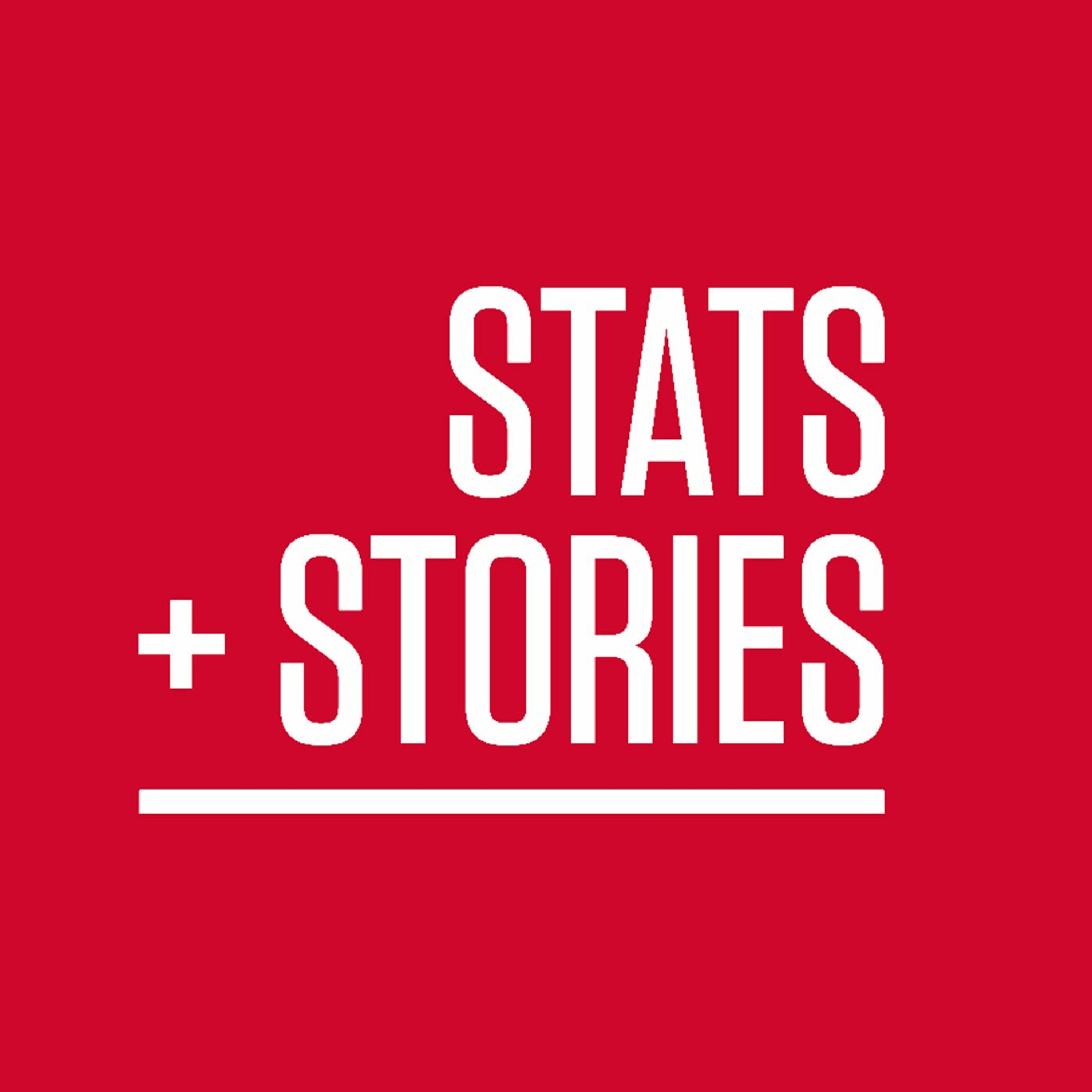
Stats + StoriesCollaboration is the Best of Statistics | Stats + Stories Episode 183The best thing about being a statistician,” he said, “is that you get to play in everyone's backyard.” That famous quote by John Tukey is optimized by our guest and the focus of this episode of Stats and Short Stories with guest Walter Piegorsch.
Walter W. Piegorsch is the Director of Statistical Research & Education at the University of Arizona’s BIO5 Institute. He is also a Professor of Mathematics, a Professor of Public Health, a Member and former Chair of the University’s Graduate Interdisciplinary Program (GIDP) in Statistics. Dr. Piegorsch’s research focuses on data science and informatics for environmenta...
2021-04-0809 min
Science TalksEpisode 7: The importance of storytelling and collaborationToday’s biggest scientific questions cannot be conducted "in a vacuum.” Dr. Kate Rhodes, a postdoctoral fellow in the laboratory of Dr. Maggie So’s lab, shares how the BIO5 Institute fosters the cross-disciplinary work that is necessary to solve these problems. She also talks about her research on a bacterial strain that causes gonorrhea, a highly prevalent sexually transmitted infection. Dr. Rhodes, a two-time recipient of the BIO5 Postdoctoral Fellowship, discusses how she employs storytelling through grant writing and public communications.
2021-04-0724 min
Stats + StoriesThe Probability of the Next Terrorist Attack | Stats + Stories Episode 182When planning for potential disasters, we often focus on hurricanes that might ravage coastal areas or tornados and droughts that strike rural parts of the Midwest. But researchers are also working to uncover the vulnerabilities faced by urban areas and that’s the focus of this episode of Stats and Stories with guest Walter Piegorsch.
Walter W. Piegorsch is the Director of Statistical Research & Education at the University of Arizona’s BIO5 Institute. He is also a Professor of Mathematics, a Professor of Public Health, a Member and former Chair of the University’s Graduate Interdisciplinary Program (GIDP) in Statistics. Dr. Pi...
2021-04-0125 min
Science TalksEpisode 6: Viruses, vaccines and advocacyThe emergence of a novel vaccine can be both a scientific triumph and point of uncertainty for the general population. Dr. Robert Jackson, a postdoctoral fellow in the laboratory of Dr. Koenraad Van Doorslaer, discusses his research on human papillomavirus - the most common sexually transmitted virus and cause of 5% of all cancers worldwide. Dr. Jackson, a recipient of the BIO5 and Canadian NSERC Postdoctoral Fellowships, also talks about his passion for communicating the scientific method, or process, to the public, specifically as it relates to sharing the utilities of both the HPV and COVID-19 vaccines.
2021-03-2631 min
Science TalksEpisode 5: Infecting others with a love for scienceHuman cytomegalovirus persists in the majority of the population worldwide and is the leading cause of infectious disease-related birth defects. Dr. Felicia Goodrum, a professor of cellular and molecular medicine, cancer biology, genetics, and molecular and cellular biology, discusses her work on this public health concern. She also shares how she “infects” others with a love for science through science communication and public outreach. The self-proclaimed lifelong learner also talks about the importance of a two-way mentorship relationship.
2021-03-1132 min
Science TalksEpisode 4: Finding our new normalNow a year into the COVID-19 pandemic, we're eager to return to life as it once was - but is that possible? If not, what does our "new normal" look like? Dr. Bonnie LaFleur, a BIO5 member and research professor of biostatistics, discusses how the different COVID-19 testing methods and vaccination efforts will enable us to one day go back to our old ways of lives. She also stresses that building "social contracts" with those in our inner circle are essential to keeping ourselves and others safe.
2021-02-2533 min
Behind The BeakerEYE can't believe this!This week, Host Jillian Bartsch talks with Erika Eggers, an associate professor in Physiology and Neuroscience and an Associate professor in Biomedical Engineering and BIO5, about her research involving the human eye. Eggers talks about how she got started in her recent research of looking into ganglion cell light responses and light adaption which change in early diabetes.Behind the Beaker is a podcast about the unbelievable science and even more unbelievable scientists behind it at the University of Arizona. Weekly episodes will feature scientists from across the board. This podcast is a Daily Wildcat production created...
2021-02-1536 min
Science TalksEpisode 3: Pursing wellness amid COVID-19Over the past year, many have become more interested in ways to support their mental, physical and emotional well-bring. Dr. Floyd "Ski" Chilton, BIO5 member and Director of the Precision Nutrition and Wellness Initiative discusses the upcoming Precision Wellness in the Time of COVID-19 public series that aims to educate the public and help them pursue health, both during the pandemic and for years to come. Chilton also shares how he pursues mindfulness and well-being, and how he imparts these messages on others through his research, outreach and books.
2021-02-1127 min
Science TalksEpisode 2: Novel treatments for COVID-19Soon after the pandemic started, more than half a million dollars was rapidly reallocated to supply 13 interdisciplinary teams with immediate funding to pursue basic science, technology, clinical or population-based research projects that directly address COVID-19.
Dr. Jianqin Lu, BIO5 member and assistant professor in the College of Pharmacy, discusses his two BIO5 COVID-19 seed grant projects. The first focuses on the use of nanotechnology to improve efficacy and minimize toxicity of anti-malarial drugs against COVID-19, while the second project explores whether enhancing COVID-19 patients’ immune systems can treat their infections.
2021-02-0428 min
Science TalksEpisode 1: A public health approach to overcoming the pandemicSoon after the pandemic started, more than half a million dollars was rapidly reallocated to supply thirteen interdisciplinary teams with immediate funding to pursue basic science, technology, clinical or population-based research projects that directly addressed COVID-19.
During the course of this and future episodes, we will learn more about the inspiration behind some of the team projects, what the rapid funding allowed them to do, and the progress they have made towards their goals.
Dr. Kristen Pogreba Brown, assistant professor of public health specializing in epidemiology and biostatistics joins us to share more about her...
2021-01-2727 min
The Anti-Doping PodcastUsing Optical Sensors to Detect Doping - Judy Su, PhDDr. Judy Su is Assistant Professor in Biomedical Engineering, Optical Sciences, and the BIO5 Institute at the University of Arizona. She is developing novel sensors that use light to detect extremely low concentrations of substances. She shares how the sensors are made, how they work, and how they could be used in testing for doping. Beyond their high sensitivity, the sensors deliver results rapidly, require low sample volumes, and are better suited to detecting microdosing and drugs with a short half life.
2020-05-1933 min
The Chosen Brew Beer PodcastAle of a Time - Dave Ellis and Luke RobertsonIn this episode, I talk to Ale of a Time duo Dave Ellis and Luke Robertson. Check out their award winning blog at http://aleofatime.com and download their brilliant podcast at https://itunes.apple.com/au/podcast/ale-of-a-time/id764214563?mt=2The Chosen Brew is a podcast for people, passionate about beer, to talk us through the six beers that changed them. Their Chosen Brews. Expect choices to be full of nostalgia, emotional wanderings and plain old loyalty as the guests tell their story through the beers that they treasure. Follow The Chosen Brew on Twitter @thechosenbrew, Facebook and Instagram...
2016-12-1359 min 2008-05-0307 min
2008-05-0307 min